|
January 14, 1751 New York Gazette To be Sold, A good well-built Sloop of about 70 Tons, not above a year old, her timbers all cedar, with large new rigging, sails, cables and anchors, now lying in Conetje’s Dock, where she may be view’d at any time: Any person inclining to purchase, may apply to Jacob Van Voorhis, or Peter Mesyer, at the North River, who will dispose of her on reasonable terms. March 11, 1751 New York Gazette or Weekly Post Boy Boston, February 18.One night last week, in bad weather, a vessel bound in from St. Kitts, ran ashore near the Light House and bilged. Last Saturday Morning, about 6 o’clock, a fire broke out in the Keeping Room of the Rev. Mr. Gray, in this town, which had got to such a head before it was discovered, that the whole room was in a flame, and ‘twas with the utmost difficulty extinguished. Most of Mr. Gray’s cloaths were burnt, and all the furniture in the room destroyed or rendered almost useless. ‘Tis said his loss (exclusive of the damage done to the house) is at least 600 l. Old Tenor. Feb. 25. A few days ago as Capt. Mackey was on his passage from Annapolis Royal, while two of his men were sitting in the steerage, a loaded musket that hung over their heads, fell down, and the cock striking against a chest, the gun went off, and shot one of them in or near the groin and wounded him so that he died in a few hours. ‘Tis remarkable that one of Capt. Mackey’s men was drowned near Castle William, as he was going out about a month ago. By a Vessel from Annapolis Royal, and another from Halifax, we have advice, that our troops at Chinecto were in perfect health and high spirits; that they had such exceeding fine weather, that all the rivers and creeks were open; and that the French Commander’s Valet de Chambre, with two German soldiers had deserted to our troops, and all agree, that the French and Indians are in great want of provisions and liquor. They all inform that the French missionary among the Indians, bribed them to murder the brave Capt. How, in the infamous manner they did, and that they did, and that he punctually pays them 50 Livres for every scalp, 100 for every prisoner, and 400 for every officer they bring in of ours. That to prevent these deserters from returning or giving any intelligence to the enemy, Col. Lawrence had prudently sent them to Annapolis by Capt. Cobb. Last Monday Evening a fire broke out on board a new sloop that had come in but the tide before from North River, and lay a-aground a little to the Northward of Minot’s T. which burnt for some time with great violence; but altho’ it was low water, an engine was with some difficulty got on board, which playing briskly soon quell’d the flames, after having done very considerable damage to the hull, sails and rigging of the sloop. From Pamequid we have advice of the death of Capt. Williams Phips, Commander of the Garrison in that place, the eldest son of his Honour the Lieutenant Governor. May 13, 1751. New-York Gazette Revived in the Weekly Post-Boy (New York, New York) To be sold at publick Vendue, on Friday the 17th Instant, at 10 o'clock in the Morning, at the Meal Market, A Number of likely Negro Slaves, lately imported in the Sloop Wolf, directly from Africa. Those that are not disposed of on that Day, will be sold at publick Vendue the Friday following. May 20, 1751. New-York Gazette Revived in the Weekly Post-Boy (New York, New York) To be Sold, A Good Boat or Shallop, of about 10 Tons, her Frame red Cedar, and is about 5 years old; her Mainsail new, Jibb but little worn; she has two good Anchors and Cables, and her Rigging in good order; - draws about 5 Feet Water when loaded. Any Person inclining to purchase, may apply to John Berrian, living at Beekman's-Slip. July 15, 1751. New-York Gazette Revived in the Weekly Post-Boy (New York, New York) The Yacht or Pleasure Boat, belonging to Capt. Roddam, being well sound with good Sails, Rigging, &c. is to be sold at publick Vendue on Thursday next, between the Hours of Eleven and One, at Mr. Ackland's Coffee-House, for ready Money.
0 Comments
February 5, 1750 New-York Gazette Revived in the Weekly Post-Boy (New York, New York) THIS to give Notice, That there is to a sold, a large Parcel of Butt, Pipe, Hogshead and Barrel Staves of various sorts; as also a Parcel of choice Chesnut Rails, and Oak Posts; likewise choice good Ship Timber, some already cut, and much more on the Ground, with House-Frames, and all sorts of other Timber for building Houses; Samples of them may be seem at Jacob Christopher Foerster's in New-York, and any Quantity will be ready to deliver to any Purchaser as soon as the North River is open, ---- There is also some Trees very fit for Keels of vessels from 40 to 50 foot long, and lies convenient on the River for building. September 27, 1750. Pennsylvania Gazette (Philadelphia, Pennsylvania) Run away, from Silas Parvin, of this city, a Negro fellow, named Tom, about five feet 6 inches high, thick well set fellow, very large legs and arms, much pitted with the small-pox, talks good English, and so smooth a tongue that he is almost capable to make any body believe all he says. He took with him when he went away, 2 good ozenbrigs shirts, 2 good pairs of trowsers, a green cloth jacket, a brown cloth coat, an old hat, a pair of old shoes with brass buckles, and blue worsted stockings. Whoever takes up the said Negro, and brings him to his said master, shall have Twenty Shillings reward, and reasonable charges, paid by SILAS PARVIN. N. B. This is to desire all masters of vessels not to carry him away. October 29, 1750. James Birket. Some Cursory Remarks Made by James Birket in his Voyage to North America, 1750-1751. New Haven: Yale U. Pr., 1916. (p. 42) 1750 Octoe 29th THE CITY OF NEW YORK (formerly New Amsterdam) is Scituated on the South So: W point of york Island One part of the Town lying upon the Sound that Separates this Island and the Mainland from Long Island, which is the Side of the town where all the Wharfs are Built and the Ships lye, The great North river Washes the other Side of the town faceing the Jerseys which Said river & the Sound Join at the fort at the Lower end of the (p. 43) town And form a Spacious Bay with many Pretty Small Islands in it. This City is well Scituated for bussiness having the Advantage of all the trade of Connecticut by the Sound as also the coast of Long Island And the Inland Country at least 200 miles by the North river large Sloops go as far as Albany wch is 166 miles and Smaller craft Amongst the Mohawks where they cary on a great trade with the Indians; and, About Albany & Esopus the make the finest flours in America, I was Credibly Informd that at the last mentiond place there has been Sold Farms at £50 pAcre taking in the whole Est PMeasure Sandy Hook is reckon'd 10 leagus from the Town this is where we enter the Ocean but I cannot think it so much as we run it down to the Hook in 2 hours indeed we had the Advantage of Wind & tide. The vessels by this means in the winter are Soon into the Harbour, Ans Soon out when the wind Serves, when in other ports they frequently frose up. As I said before the wharfs & places where there vessels lye are on the Eastside of the Town & for the whole Length of it there is a good depth of water And all vessels Load & Discharge without the help of boats or lighters which is very convenient. (p. 46) They also Build many vessels here of all Sizes, And are well Supply'd with Timber from the Jerseys from Long Island, And also from Statten Island which I believe to be the Best in this part of the Country as it grows near the Sea and upon a Clay Soil. I would likewise observe that the Trade of the Jerseys is pretty much divided between, New York and Philadelphia, the which is a great Advantage to Both; The Yorkers draw a Great quantity of Bread Flour, and wheat, yearly from the Jerseys by way of Amboy, and down Rariton river by way of Brunswick there being a very good Corn Cuntry up that river. This City also reaps great Advantages by the Navigation of the North or Hudsons river, As the City of Albany lyes so Near the Indians that it (p. 47) Enables them to Cary on the furr Trade to greater Advantage then Any other Province in America, And helps them in their Remittances to England. December 24, 1750. New-York Gazette Revived in the Weekly Post-Boy (New York, New York) To be SOLD, A Good well-built Sloop of about 70 Tons, not above a Year old, her Timbers all Cedar, with large new Rigging, Sails, Cables, and Anchors, now lying in Coentje's Dock, where she may be view'd at any Time: Any Person inclining to purchase, may apply to Jacob Van Voorhis, or Peter Mesyer, at the North River, who will dispose of her on reasonable Terms. April 24, 1749. New-York Gazette Revived in the Weekly Post-Boy (New York, New York), To be sold, a Plantation at Tapan, in the County of Orange, and Province of New-York, containing about 200 Acres, 20 of which are fresh Meadow, and 100 very good for Wheat, the rest well water'd and timber'd; there is a good Dwelling-House thereon, with a bearing Orchard of about 200 Apple and Pear Trees, and a Barn of 55 by 50 Foot, situated about 5 Miles from a Landing on the North River, convenient for the York Markets. Whoever has a Mind to purchase, may, by applying to Teunis DeClarke, living near the Premises, be informed of the Title and Conditions of Sale. May 8, 1749 New-York Gazette Revived in the Weekly Post-Boy (New York, New York) To be Sold by publick Vendue, on the Twenty fourth Day of May next, at New Windsor, in Ulster County. A Small Lot of Land containing above an Acre, having a good Dwelling-House thereon, a Story and a Half high, Forty five Feet long, and Twenty one wide, and a good Cellar under the Whole, and two Rooms on each Floor, with a Fire Place in each; a large Barn near it; and a small Lot with a good Store-House and Dock fit for a Store-Keeper, being the publick Landing Place frequented by the numerous Inhabitants of a large plentiful Country. The said Lots and Houses are pleasantly situated on the West Bank of Hudson's River, at New Windsor aforesaid; also 6 Acres and a Half of Meadow belonging to the said Lots, near the same. Also 50 Acres of Land about a Mile from Hudson's River, having a Frame-House thereon, and a young bearing Orchard; some of the Land is cleared and inclosed. All the said Houses and Lots will be sold together, or separate, as the Purchasers please. August 14, 1749 New York Evening Post New York. Last Tuesday evening a young man of about 19 years of age, apprentice to a baker in this city, went to bed in an upper room, being intoxicated, got up in the night, opened a door which was in the second story and fell down into a gang-way, where he lay till four o’clock in the morning, at which time the people of the house arose to work, and finding him there, took him up; but he died a few minuets after. Last week, one Mr. Knox, Master of a small sloop send up the North-River, and coming near the Highlands, two men came on board him in a canoe and asked Mr. Knox for a dram, which he readily gave them; and after taking a turn or two upon deck, each of them drew forth a postol, which they had conceal’d, and coming up to Mr. Knox demanded his money, he told them that he had none, whereupon they forc’d him down into the fore-castle, one of them went into the cabbin, broke open his chest but finding no money took a bottle of rum and so went off leaving Mr. Knox barr’d down in the fore-castle, where he remained till his Negro, whom they had confin’d upon deck, released him. We also hear that a sloop belonging to Capt. Bayard, was robb’d at or near the same place of nine pound in money which was all they had on board. We hear that a person was lately robbed on the road near Whippany, of about twenty sillings, by two fellows who search’d the linings of his cloaths, hat and even shoes to see if he had none conceal’d. We hear from the Jerseys, that they have lately had a considerable quantity of hail, as large as pidgions eggs which did a considerable damage to the Indian-Corn and Buck-Wheat. Last Saturday His Majestys Ship the Grayhound, returned into this harbor from her cruze. August 21, 1749 New York Gazette or Weekly Post Boy Within a few days past we have heard of several robberies committed on boats going up and down the North River, by persons unknown; and yesterday about one o’clock a man dressed in woman’s cloaths, was taken up in this city on suspicion Goal: He had been to church in the forenoon, in his woman’s habit, which was neat and good; but in his bundle was his man’s cloaths very poor and mean; on his being apprehended, he pretended that he came from the Mannor of Philipsbourgh, and disguised himself there on a wager. But ‘tis conjectured that he will turn out on a wager one of those robbers. Yesterday Mrs. Pickeman, the wife of Capt. Pickeman of this city, being in good health in the morning, was taken ill suddenly, and died before any assistance could be obtained. Last night between 9 and 10 o’clock, a fire broke out on board a new ship belonging to Capt. Thomas of this city, lying at Cannon’s Wharff, and got to such a head before it was discover’d, that it was found impossible to extinguish it; and it being almost high water, she was tow’d off into the stream, and with the tide carried above the town, where she was entirely burnt down to the water’s edge. She was built up at Connecticut, and was brought, down but a few days ago, ballasted with wood, all which, together with the masts, yards and rigging, was destroyed. It was with difficulty some other vessels lying near her when the fire broke out, were preserved. On the alarm of the fire, Mrs. Levy, a widow gentlewoman in this city was taken with a fainting fit, suppos’d to be with the fright and died immediately. October 16, 1749 New-York Gazette Revived in the Weekly Post-Boy (New York, New York) RUN away from the Sloop Speedwell of Philadelphia, Nathan Solly, Master, Thomas Nichols, of a small Stature, long thin visag'd, very swarthy, a long Nose, something pitted with the small Pox, and wore a light colour'd Wig. George -------, something larger than the other, full fac'd and smooth, except some Pimples occasioned by drinking, and wore a Worsted Cap: It is supposed they have stolen a new Rateen Coat of a light brown, with large white Buttons, a pair of black Breeches, a Gingham Jacket, two white and two Check Shirts, two pair of Worsted Stockings, and old Castor Hay with a Hole in the Crown, and Fifteen or Twenty Pounds in Cash: Had on when they went away, blue Jackets, Check Shirts, white tary [sic; "tarry"?] Trowsers, old Shes and Stockings, old Hats and very dirty. Whoever takes up and secures said Fellow, so that Capt. Solly may have them again, shall have Thirty Shillings Reward for each, and reasonable Charges, paid by Nathan Solly. N. B. The said Sloop designs for Philadelphia in two Days, and now lies at the Crane. March 29, 1748. Pennsylvania Gazette (Philadelphia) Custom-House, Philadelphia, Enter’d in. Sloop Hannah, Nat, Newman, from Boston. Diamond, Tho. Wilkins, from Bermuda, Industry, Simon Bunker, from Boston. Trial, David Pierce, from Newport. Philadelphia, John Stinson, from N. York. Milisent, John Butler, from Ditto. Success, Ephraim Jones, from New-England. Brigt. New George, Oswald Eve, from St. Eastasia Cumberland, Joseph Conyers, from Bermuda. Ship Burlington, Charles Smeyter, from London. Outwards. Sloop Mary, Smuel Coverly, for Fyal. Sloop Hannah, Nat. Newman, for Boston. Industry, Simeon Bunker, for Ditto. Brigt. Samuel, Hugh Bowes, for Lison. Cleared. Snow Prince William, John Peele, to Madeira. Brigt. Sally, John Austin, to Barbados. Sloop Elizabeth, Daniel Amory, to Rhode-Island. Vulcan, Abraham Bergeau, to Madeira. Susannah and Francis, George Vincent Dawes, to Coracoa. Dolphin, John Godfrey, to Newport. Milisent, John Butler, to N. York. Speedwell, Nathan Solly, to Ditto. Ship Phoenix, John Mason, to S. Carolina. July 11, 1748 New York Gazette or Weekly Post Boy (New York, N.Y.) Friday last his Excellency our Governor embark'd on board a Sloop, prepared here for that Purpose, and sail'd with a fair Wind for Albany, in order to meet the Chiefs of the Six Nations of Indians there, to renew the ancient League with them, and deliver the Presents sent by His Majesty to those People. November 17, 1748. Pennsylvania Gazette (Philadelphia)
Custom House Philadelphia, Entred Inwards. Brigt. Chesterfield, Thomas Costam, from Cape Francois Sloop Dolphin, Daniel Amory, from New-Port. Charming Hannah, Robert Gibbs, from Ditto. Outwards. Brigt. Sally, John Austin, for Barbados. Sloop Tryal, Joseph Dickinson, for Fyall. Snow Friendship, Thomas Ellworthy, for Jamaica. Sloop Charming Hannah, Robert Gibbs, for R. Island. Cleared. Brigt. Dolphin, Edward Snead, to Dublin. Friendship, Joseph Browne, to New-Providence. Nancy, Thomas Potts, to Boston. Recovery, John Anderson, to Barbados. Sloop Speedwell, Nathan Solly, to New-York. Ship John, George Matthews, to Jamaica. June 22, 1747 New York Gazette or Weekly Post Boy NEW-YORK, June 22. Yesterday about 2 o'Clock his Excellency our Governor embarked on board a Sloop, and immediately set Sail with a fair Wind for Albany. October 1, 1747 Pennsylvania Gazette (Philadelphia)
Run away, on the 20th of September last, from Cohansie Bridge, a very big Negroe man, named Sampson, about 50 years of age, has some Indian blood in him, is hip-shot, and goes very lame; he has taken his son with him, a boy about 12 or 14 years of age, named Sam; he was born of an Indian woman, and looks much like an Indian, except in his hair; both belong to Silas Parvin of Philadelphia, and are both well clothed, only the boy is barefoot; they have taken with them a gun and ammunition, and two rugs; can both talk Indian very well, and it is likely they have dressed themselves in Indian dress, and gone towards Carolina. Whoever secures said slaves, so that their master may have them again, shall have Five Pounds reward, and all reasonable charges, paid by Silas Parvin. Pennsylvania Gazette, May 1, 1746 Custom-House, Philadelphia, Entered In. Sloop Elizabeth, John Pientice, from Barbados. Speedwell, Daniel Robinson, from Virginia. Sarah, Thomas Dudley, from N. Carolina. Endeavour, Benjamin Tatem, from S. Carolina. Lark, Peter Ganthony, from Barbados. Dove, William Dickinson, from Bermudas. Brigt. Elizabeth, Hugh Hill, from London. Schooner Fame, Elisha Woodberry, from N. England. Outwards. Ship Balance, Richard Gill, for Antigua. Frere, Thomas Hyder, for Barbados. Sloop Delight, Richard Talbot, for Bermuda. Providence, James White, for S. Carolina. Warwick, Robert Dickinson, for Antigua. Adolph, John Bush, for Eustatia. Henry, John Dickinson, for Antigua. Jolly Batchelor, Joseph Newbold, for Barbados. George, John Todd, for Antigua. Elizabeth, John Prentice, for Barbados. Anne, Benjamin Stovell, for Jamaica. Lydia, and Betty Reuben Worth, for Coracoa. Eunice, John Gibbs, for Antigua. Batchelor, Christopher Goddard, for Madeira. Schooner Bredah, Daniel Burch, for Coracoa. Cleared. Brigt. Delaware, James Taylor, to Jamaica. Sloop Francis, John Dill, to Barbados. Charming Betty, Josias Gibbs, to Coracoa. Endeavor, John Harding, to Boston. Francis, Stephen Beake, to Coracoa. Abigail, Thomas Bourne, to Boston. Delight, Richard Talbot, to St. Kitts. Ship Mary, Bernard Martin, to London. William’s Galley, Henry Harrison, to Maryland. Schooner Britannia, George Sisson, to Cape-Breton. June 26, 1746 Pennsylvania Gazette (Philadelphia) Custom-house, Philadelphia, Entred In. Sloop Pearl, John Morgan, from Barbados. Constantine, John Deacon, from St. Kitts. Endeavour, John Harding, from Boston. Lydia & Betty, Reuben Worth, from S. Carolina. Little Betty, Jacob Jones, from Virginia. Bermuda Merchant, Stephen Newbold, fr. Bermuda. Scooner Unity, Thomas Cliffton, from Virginia. Brigt. Exchange, William Simpson, from Antigua. Outwards. Brigt. Greyhound, Arthur Burrows, for Lisbon. Sloop Providence, Pyramus Green, for New-Providence. Ship Bolton, Edward Dowers, for Antigua. Cleared. Sloop Argyle, Duncan Murrey, to Maryland. Endeavour, John Haiding to Boston. Mary, William Mitchell, to Antigua. Ship Molly, Joseph Rivers, to Cape-Breton. Brigt. Dolphin, Samuel Holme, to Jamaica. Ship Martha, James Crawford, to Londonderry. Brigt. George, John M’Cleland, to Coast of Africa. July 3, 1746 Pennsylvania Gazette (Philadelphia) Custom-house, Philadelphia, Entered in. Scooner Dolphin, John Austin, from Barbados. Sloop Prince Frederick, Clement Conyers, from Tortuga. Sloop Sea Nymph, Robert Harvey, from Tortuga. Sloop Sea Horse, Robert Zuill, from New-Providence. Scooner Good Intent, Henry Harramond, fr. S. Carolina. Brigt. Recovery, Joseph Greenway, from Barbados. Outwards. Sloop Lydia & Betty, Nathan Solly, for Georgia. Ship Catharine, Joseph Smith, for Londonderry. Sloop Pearl, John Morgan, for Barbados. Brigt. Recovery, Joseph Greenway, for Barbados. Cleared. Brigt. Argyle, John Seymour, to Cape-Breton. Brigt. Carpenter, John Green, to Madeira. Sloop Lydia and Betty, Nathan Solly, to Georgia. Brigt. Greyhound, Arthur Burrows, to Lisbon. September 4, 1746 - Pennsylvania Gazette (Philadelphia) Custom-House, Philadelphia. Entered In. Sloop Unicorn, Joseph Doane, from Boston. Ship Griffin, John Chubbard, from N. Castle on Dela. Schooxer Revenge, John Johnson. From St. Kitts. Outwards. Sloop Francis, John Darrell, for Madeira. Mary, Peter Godfrey, for Jamaica. Ann, Richard Whitter, for Jamaica. Tryton, Samuel Skinner, for St. Kitts. Mary, Amos Minot, for St. Kitts. Real Design, Nathaniel Morgan, for St. Kitts. Delight, Richard Talbot, for St. Kitts. Unicorn, Joseph Dean, for Boston. Speedwell, Silas Parvin, for Albany. Lydia & Betty, Nathaniel Solley, for Albany. Snow Chefter, George Blair, for Maryland. Cleared. Sloop Friendship, Isaac Cex, to N. Providence. Tryal, Thomas Dufree, to Rhode-Island. Brigt. Prompey, George Davis to Boston. 1746-09-14 New York Evening Post New-York, September 14th. Extract of a letter from Albany, dated September 7th, 1746. Yesterday an account arrived from Saratoga, that the French Indians had killed five of our soldiers and taken three captive. There is near a 100 of our Indians come to this place, to join our forces against Canada, they say they came of themselves to fight for the English; they are none of those Indians that received the presents but some that never was here before. Last week sailed from hence the Privateer Sloop Clinton Capt. Thomas Beven, on a cruze against his Majesty’s enemies, she was extraordinary well fitted and man’d. Also sailed from hence Capt. John Lawrence in a small Privateer Sloop, mounting four carriage guns, and eight swivels, and about thirty men. Also, lies ready the Privateer Dolphin, and will sail with all possible expedition. Last Friday sailed from hence for Albany, five sloops with the companies raised in the Jersey’s and elsewhere. September 25, 1746 Pennsylvania Gazette (Philadelphia) Custom-house, Philadelphia. Entered In. Sloop Francis, Francis Dickenson from Antigua. Endeavour, Reuben Worth from New England. Ann, Peter Milbey from Virginia. Brigt. Rebecca, Benjamin Burk from Dublin. Ship William and Mary, John Cowen from Newcastle. Brigt. Globe, Daniel Rees from Jamaica. Brigt. John, Thomas Marshal from Newcastle on Del. Scooner Charles-town, William Grant from South Carolina. Outwards. Scooner Dolphin, J. Austin for S. Carolina. Joseph, Joseph Hollet for Boston. Sloop Endeavour, Reuben Worth for Rh. Island. Humming-bird, Charles Dingee for Virginia. Charity, Vincent Salsus for Barbados. Ship Griffin, John Chubbard for Maryland. Molly, Joseph Rivers for Barbados. Cleared. Sloop Providence, Pyramus Green to Alabny. Brigt. Sally, Neil Mr. Neil to Londonderry. Sea-flower, David Dewar to Jamaica. Nancy, James Brown to Liverpoole. Schooner Joseph, Joseph Hollet to Salem. October 16, 1746 Pennsylvania Gazette (Philadelphia) Custom-House, Philadelphia, Entered in. Ship Hope, Robert Richie, from Coracoa. Friendship, Henry Lisle, from London. Anne Galley, George Houston, from Ditto. Brigt. Elizabeth, Edward Gill, from Madeira. Greyhound, Arthur Burrows, from Lisbon. Schooner Abigail, Josiah Kollogg, from Salem. Dolphin, Elias Kingston, from Boston. Sloop Content, Thomas Wells, from Bermuda. Susannah, Silvanus Allen, from Nantucket. Speedwell, Silas Parvin, from Albany. Lydia and Betty, Nathan Solly, from Ditto. Out. Sloop Elizabeth, William Edgar, for Barbados. Schooner Dolphin; Elias Kingston, for Boston. Cleared. Sloop Prosperity, Nathan Young, to Boston. Charity, Vincent Saltus, to Barbados. Schooner L’emmon, Lazarus Sampson, to Boston. October 30, 1746 Pennsylvania Gazette (Philadelphia) Custom-House, Philadelphia, Entered in. Sloop Raven, Peter Folger, from Nantucket. Katie, Cornelius Bowne, from N. Providence. Billander Friendship, Samuel Rossiter, from Lisbon. Ship Neptune, Thomas Wilkinson, from Leith. Schuoner Chance, John Byrn, from Salem. Providence, Pyramus Green, from Albany. Brigt. Carpenter, John Green, from Madeira. Outwards. Sloop Tryal, Clothier Pierce. For R. Island. Lydia and Betsey, Nathan Solly, for S. Carolina. Providence, Pyramus Green, for N. Providence. Rose, John Clark, for N. York. Mary, Joseph Conyers, for N. Providence. Schooner Revenge, John Johnston, for St. Kitts. Chance, John Byrn, for Salem. Brigt. Warren, William Condy, for Jamaica. Greyhound, Arthur Burrows, for Barbados. Brigt. Chesterfield, Thomas Coatam, for Barbados. Snow George, Nathaniel Ambler, for Cape Breton. Ship Hope, Robert Richey, for Coracoa. Catharine and Mary, William Childs, for Jamaica. William and Mary, William Blair, for Jamaica. Cleared. Schooner Charlestown, William Grant, to Jamaica. Revenge, John Johnston, to St. Kitts, Ship Molly, Joseph Rivers, to Barbados. Snow Peggy, Anthony Rock, to Barbados. Sloop Lydia, Barzilla Folger, to Boston. Endeavour, John Harding, to Boston. Content, Thomas Wells, to S. Carolina. Henry, James Brown, to Jamaica. Elizabeth, William Edgar, to Barbados. Providence, John Gardner, to N. Providence. Mary, William Mitchel, to Barbados. Francis, Francis Dickinson, to Bermuda. Lydia and Betty, Nathan Solly, to S. Carolina. Tryal, Clothier Pierce, to R. Island. Susannah, Sylvanus Allen, to Boston. November 14, 1746 and November 24, 1746 New York Evening Post
New York. On Friday evening last, arrive here from Albany, twelve Mohawk Indian Warriers; as also a party of our men, 10 in number, who had been amongst the French Settlements in Canada; where about 40 miles to the westward of the City of Montreal. They attacked, 4 or 5 families, and brought from thence, after first having burnt the houses and kill’d the cattle, & c. four French scalps and 8 prisoners. And on Saturday noon following, by Order of his Excellency, were landed from on board the sloop, attended by a company of soldiers; the Indians march’d first, one after the other; with the scalps fixed upon a stick, adorned with read riban’s, after them followed the prisoners, the Indians being painted and drest with feathers on their heads, after their war manner, the captives being also painted and clad in Indian dress; thus they march’d in prosession to attend the Governor, the Indian Captain as he led the van; cry’d with a very mournful cry, Yo ------ho. Yo------ho. All the time he march’d. The signification of this cry, is their having scalps with them. These being the first prisoners and scalps taken during this war. From Alexander Hamilton. Gentleman's Progress: The Itinerarium of Dr. Alexander Hamilton, 1744. Carl Bridenbaugh, ed. Chapel Hill, U. North Carolina Pr., 1948 1744-06-20 -- Gentleman's Progress. Alexander Hamilton. p. 48 Wednesday, June 20. [in New York City] I dined this day at Todd's, where I mett with one Mr. M----ls, a minister at Shrewsbery in the Jerseys who had formerly been for some years minister at Albany. I made an agreement to go to Albany with him the first opportunity that offered. I enquired accordingly (p. 49) at the coffee house for the Albany sloops, but I found none ready to go. *** I . . . at night prepared my baggage to go for Albany.
Thursday, June 21. I dined at Todd's with several gentlemen and called upon Mr. M----ls at two o'clock, with whom I intended to go by water to Albany in a sloop belonging to one Knockson. *** After getting my baggage and some provisions ready, I went on board the Albany sloop where I found Mr. M-----s and his wife, an old jolly fat Dutchwoman, mother to the patroon at Albany, a gentleman there of Dutch extract, the chief landed man in the place. p. 50 Nutting Island. Having a contrary wind and an ebb tide, we dropt anchor about half a mile below New York and went ashore upon Nutting Island [Governor's Island], which is about half a mile in dimension every way, containing about 60 or 70 square acres. We there took in a cask of spring water. *** We had on board this night 6 passengers, among whom were three women. They all could talk Dutch but myself and Dromo [his slave], and all but Mr. M-----s seemed to prefer it to English. At eight o'clock at night, the tide serving us, we weighed anchor and turned it up to near the mouth of North River and dropt anchor again at 10 just opposite to the great church in New York. Friday, June 22d. While we waited for the tide in the morning, (p. 51) Mr. M-----s and I went ashore to the house of one Mr. Van Dames where we breakfasted and went from thence to see the new Dutch church, a pritty large but heavy stone building. . . . The church within is kept pritty clean, and when one speaks or hollows, there is a fine eccho. We went up into the steeple where there is one pritty large and handsom bell, cast att Amsterdam, and a publick clock. From this steeple we could have a full view of the city of New York. Early this morning two passengers came on board of the sloop, a man and women, both Dutch. The man was named Marcus Van Bummill. He came on board drunk and gave us a surfeit of bad English. If any body laughed when he spoke, he was angry, being jealous that they thought him a fool. He had a good deal of the bully and braggadocio in him, but when thwarted or threatened, he seemed faint hearted and cowardly. Understanding that I was a valitudinarian, he began to advise men how to manage my constitution. "You drink and whore too much," said he, "and that makes you thin and sickly. Could you abstain as I have done and drink nothing but water for 6 weeks, and have to do with no women but your own lawful wife, your belly and cheeks would be like mine, look ye, plump and smooth and round." With that he clapt his hands upon his belly and blowed up his cheeks like a trumpeter. He brought on board with him a runlett of rum, and, taking it into his head that somebody had robed him of a part of it, he went down into the hold and fell a swearing bitterly by Dunder Sacramentum, and Jesu Christus. I, being upon deck and hearing a strange noise below, looked down and saw him expanding (p. 52) his hands and turning up his eyes as if he had been at prayers. He was for having us all before a magistrate about it, but at last Knockson, the master of the sloop, swore him into good humour again, and persuaded him that his rum was all safe. He quoted a deal of scripture, but his favorite topics when upon that subject was about King David, and King Solomon, and the shape and size of the Tower of Babel. He pretended to ahve been mighty familiar with great folks when they came in his way, and this familiarity of his was so great as even to scorn and contemn them to their faces. After a good deal of talk and rattle, he went down and slept for four hours and, when he walked, imagined he had slept a whole day and a night, swearing that it was Saturday night when it was only Friday afternoon. There was a Dutch woman on board, remarkably ugly, upon whom this Van Bummill cast a loving eye and wanted much to be at close conference with her. Greenwitch. At twelve a clock we passed a little town, starboard, called Greenwitch, consisting of eight or ten houses, and two or three miles above that on the same shore, a pretty box of a house with an avenue fronting the river, belonging to Oliver Dulancie. On the left hand some miles above York, the land is pritty high and rockey, the west bank of the river for severall miles bing a steep precipice above 100 foot high. Mr. M-----s read a treatise upon microscopes and wanted me to sit and hear him, which I did, tho' with little relish, the piece being trite and vulgar, and tiresome to one who has seen Leewenhoek and some of the best hands upon the subject. I soon found M----ls's ignorance of the thing, for as he read he seemed to be in a kind of surprize (p. 53) at every little trite observation of the author's. I found him to be an entire stranger to the mathematicks, so as he knew not the difference betwixt a cone and a pyramid, a cylinder and a prysm. *** He could talk Latin and French very well and read the Greek authors, and I was told he spoke the Dutch to perfection. *** We passed a little country house belonging to one Philips at 4 a'clock, starboard. This house is about 20 miles above York. We had severall learned discourses in the evening from Van Bummill concerning doctors. "You are a doctor," says he to me; "what signifys your knowledge? You pretend to know inward distempers and to cure them, but to no purpose; your art is vain. Find me out a doctor among the best of you that can mend a man's body half so well as a joiner can help a crazy table or stool. I myself have spent more money on doctors than I would give for the whole tribe of the if I had it in my pocket again. ***" (p. 54) This was the substance of his discourse, tho it was not so well connected as I have delivered it. After this harangue he took a dram or two and got again into his wonted raving humour. He took it into his head that Lord B------e was confined in the tower of Troy, as he called it, went down into the hold, and after he had disgorged what was upon his stomach, he went to sleep. . . . *** We had a fresh westerly wind att night, which died away at 10 a'clock, and we dropt anchor about 40 miles above York. Saturday, June 23. We weighed anchor about 4 in the morning, having the wind northeast and contrary, and the tide beginning to fall, we dropt anchor again at 7. We went ashore to fill water near a small log cottage on the west side of the river inhabited by one Stanespring and his family. The man was about 37 years of age, and the woman 30. They had seven children, girls and boys. The children seemed quite wild and rustick. They stared like sheep upon M-----s and I when we entered the house, being amazed (p. 55) at my laced hat and sword. They went out to gather blackberries for us, which was the greatest present they could make us. In return for which, we distributed among them a handfull of copper halfpence. This cottage was very clean and neat but poorly furnished. Yet Mr. M-----s observed severall superfluous things which showed an inclination to finery in these poor people, such as a looking glass with a painted frame, half a dozen pewter spoons and as many plates, old and wore out, but bright and clean, a set of stone tea dishes, and a tea pot. *** We had a pail of milk here which we brought on board, and the wind coming southerly at eleven a'clock, we weighed anchor and entered the Highlands which presented a wild, romantick scene of rocks and mountains covered with small scraggy wood, mostly oak. Dunder Barrak -- Anthony's Nose -- Cook's Island We passed Dunder Barrak, or Thunder Hill, larboard, at half an hour after eleven, and another hill, starboard, called Anthony's Nose from its resemblance to a man's nose, under which lies Cook's Island, being a small rock about 10 paces long and 5 broad upon which is buried a certain cook of a man of war from whom it got its name. His sepulchre is surrounded with 10 or 12 small pine trees about 20 foot high which make a grove over him. This wild and solitary place, where nothing presents but huge precipices and inaccessible steeps where foot (p. 56) of man never was, infused in my mind a kind of melancholy and filled my imagination with odd thoughts which, at the same time, had something pleasant in them. It was pretty to see the springs of water run down the rocks, and what entertained me not a little was to observe some pretty large oaks growing there, and their roots to appearance fixed in nothing but the solid stone where you see not the least grain of mould or earth. The river is so deep in these Narrows of the Highlands that a large sloop may sail close upon the shore. We kept so near that the extremity of our boom frequently rustled among the leaves of the hanging branches from the bank. In some places of the channel here there is 90 fathom water, and very near the shore in severall places 70 or 60 fathom. Hay Ruck We passed the Hay Ruck, a hill so called from its resemblance, upon our starboard at dinner time. There are several cottages here, very small that a man can scarce stand upright in them, and you would think that a strong fellow would carry his wooden hut upon his back. Doeper's Island About three in the afternoon we cleared the Highlands and left a small island called Doeper's, or Dipper's Island, [Pollopel] to the starboard. It is so named because, they say, it has been customary to dip strangers here unless they make the sloop's crew drink, and by that they save their dipping and are made free in the river. Wherefor, as I never had been that way before, I saved my dipping with a bottle of wine which I spared them from my stores. Butter Mountain -- Murder Creek At 4 a'clock we passed Butter Mountain on our larboard, (p. 57) above which is Murder Creek, so called from a massacre of the white men that was committed by the Indians at the first settlement of the part. Dancing Hall Att 6 a'clock we passed Dancing Hall larboard, a little square and level promontory which runs about 50 paces into the river, overgrown with bushes where, they report, about 60 or 70 years ago, some young people from Albany, making merry and dancing, were killed by some Indians who lay in ambush in the woods. We had some discourse this evening from Van Bummill about the Tower of Babel, which was his constant and darling theme. He told us that in all his reading he could never be informed of the height of it, and as to its figure, he was pretty certain of that from the pictures of it which he had seen. When he had finished his argument he got to talking in a medley of Dutch and English to the women, which confusion of language was a propos after he had been busy about the Tower of Babel. The learned Van Bummill and the two Dutch women left us at seven a'clock, going ashore to a place two miles below Poughcapsy where they lived. Poughcapsy We anchored at eight o'clock at the entry of that part of the river called Long Reach, the weather being very thick and rainy, and close by us on the starboard side stood a small village called Poughcapsy where the master and hands went ashore and left us to keep the sloop. Sunday, June 24th. At four in the morning Mr. M-----s and I went ashore to the tavern, and there we met with a justice of the peace and a New Light taylor. The justice (p. 58) seemed to have the greatest half or all the learning of the county in his face, but so soon as he spoke, we found that he was no more learned than other men. The taylor's phizz [face] was screwed up to a sanctified pitch, and he seemed to be either under great sorrow for his sins or else a hatching some mischief in his heart, for I have heard your hipocritical rogues always put on their most solemn countenance or vizzard when they are contriving how to perpetrate their villainies. We soon discovered that this taylor was a Moravian. The Moravians are a wild, fanatick sect with which both this place and the Jerseys are pestered. They live in common, men and women mixed in a great house or barn where they sometimes eat and drink, sometimes sleep, and sometimes preach and howl, but are quite idle and will employ themselves in no usefull work. They think all things should be in common and say that religion is intirely corrupted by being too much blended with the laws of the country. They call their religion the true religion, or the religion of the Lamb, and they commonly term themselves the followers of the Lamb, which I believe is true in so far as some of them may be wolves in sheep's clothing. This sect was first founded by a German enthusiast, Count Zenzindorff, who used to go about some years agoe and perswade the people to his opinions and drop a certain catechism which he had published upon the high way. *** M-----ls and I anatomized this Moravian taylor in his own hearing, and yet he did not know of it, for we spoke Latin. He asked what language that was. The justice told him he believed it was Latin, at which the cabbager [tailor] sigh'd and said it was a pagan language. We treated him, however, with a dram, and went (p. 59) from the tavern to one Cardevitz's who, having the rheumatism in his arm, asked my advice, which I gave him. The land here is high and woody, and the air very cool. Sopus Village We weighed anchor att 7 a clock with the wind south west and fresh and half an hour after passed by Sopus, a pleasant village situated upon the west side of the river, famous for beer and ale. Little Sopus Island A little above that is a small island called Little Sopus which is about half way betwixt Albany and York. At Sopus we passed by the Governour's fleet consisting of three painted sloops. That therein Clinton was had the union flag a stern. He had been att Albany treating with the Indians. Blue Mountains We now had a sight of the range of mountains called the Catskill, or Blue Mountains, bearing pritty near N. W. and capd with clouds. Here the river is about 2 miles broad, and the land low, green and pleasant. Large open fields and thickets of woods, alternatly mixed, entertains the eye with variety of landskips. Ancrum -- Ransbeck At 12 a'cock we sailed by Ancrum, starboard, the seat of Mr. Livingston, a lawer, [sic] where he has a fine brick house standing close upon the river. The wind blew very high att south east. At half an hour after 12 we saw the town of Ransbeck, a German town, starboard, in which are two churches. p. 60 Livingston Mannor At one a'clock we scudded by Livingston Mannor, then the Catskill Hlls, bore W. by south. At three o'clock [sic] we sailed by a Lutheran chappel larboard, where we could see the congregation dismissing, divine service being over. Carnine Island--Musman's Island At 4 a'clock we passed by Carnine Island, about 3 miles in length. At five we sailed past Musman's Island, starboard, where there is a small nation of the Mochacander Indians with a king that governs them. We run aground upon a sand bank at half an hour after 5 a'clock and by hard labour got clear again in about an hour. This was a great disappointment to us, for we expected that night to reach Albany. There came up a thunder gust as soon as we got clear which obliged us to furle our sails and fix our anchor, but it soon went over; so with a small wind we made three miles farther and passed a sloop bound for York where some fine folks were on board. At eight a'clock there came up a hard storm with very sharp thunder so that we were obliged to let go our anchor again and there remain all night. Monday, June 25th. We went ashore this morning upon a farm belonging to 'Cobus Ranslaer, brother to the Patroon at Albany. (James by the Dutch appellation is 'Cobus, being Jacobus contracted.) There is a fine saw mill that goes by water. Prec Stone At seven o clock, the wind being southerly, we hoisted anchor, and sailing up the river we passed a large stone, larboard, called Prec Stone, or Preaching Stone, from its resemblance to a pulpit. We had not made much way before the wind changed to (p. 61) north west so we resolved to go to Albany in the sloop's canoe and went ashore to borrow another to carry our baggage. We found the poor people there in great terror of the Indians; they being apprehensive that they would begin their old trade of scalping. Albany We set off in the canoes at nine a clock and saw Albany at a distance. We landed upon an island belonging to Mr. M-----s, upon which there was fine grass of different sorts and very good crops of wheat and pease, of which they bring up great quantities here for the use of the ships -- the bug not getting into their pease there as with us. These were the first fields of pease I had seen since I left Brittain. We met several Dutchmen on the island who had rented morgans of land upon it; they call half an acre of land there a morgan. These people were very inquisitive about the news and told us a French man and his wife that had been at Albany the day before we arrived. They had come from Canada, and it was they we saw on board the sloop that passed us last night. The Frenchman was a fugitive, according to his own account, and said he had been a priest and was expelled from his convent for having an intrigue with that lady who was now his wife. The lady had been prosecuted at law and had lost the greatest part of her estate which went among those cormorants, the lawyers. The Governour of Canada, Mons'r Bon Harnois, being her enemy, she could not expect justice, and therefor fled with this priest to the English settlements in order to prevent her being entirely beggar'd, taking the residue of her estate along with her. This Bonharnois is now a very old man, and, they say, behaves himself tyrranically in this government. *** This day there came some Canada Indians in two canoes to Albany to pursue this priest and his lady, 15,000 livres were laid upon each of their heads by the Governour. They said they had orders to bring back the priest dead or alive, if dead to scalp him and take the consecrated flesh from his thumb and forefinger. The lady they were to bring back alive, but they came too late to catch their game. Mr. M-----s imagined that all this story was a plausible fiction, and that the Frenchman was sent among them as a spy, but this conception of his to me seemed improbable. Albany Tuesday, June 26th, Early this morning I went with Mr. M-----s to Albany, being a pleasant walk of two miles from the island. We went a small miles out of town to the house of Jeremiah Ranslaer, who is dignified here with the title of Patroon. *** This mannor is divided into two equal halfs by Hudson's River, and the city of Albany stands in the middle of it. This city pays him a good yearly rent for the liberty of cutting their fire wood. The Patroon is a young man of good mein and presence. He is a batchellor, nor can his friends perswade him to marry. *** He has a great number of tenants (p. 63) upon his mannor. . . . Mr. M-----s and I dined att his house and were handsomely entertained with good viands and wine. After dinner he showed us his garden and parks, and M-----s got into one of his long harangues of farming and improvement of ground. At 4 a'clock M-----s and I returned to town where M-----s, having a general acquaintance, for he had practised physick ten years in the city and was likewise the Church of England minister there, he introduced me into about 20 or 30 houses where I went thro' the farce of kissing most of the women, a manner of salutation which is expected (as M-----s told me) from strangers coming there. I told him it was very well, if he led the way I should follow, which he did with clerical gravity. This might almost pass of a pennance, for the generality of the women here, both old and young, are remarkably ugly. At night we went to the island, where we supped. While we were at supper something very strong like burnt oatmeal which they told me was an animal called a schunk, the urine of which could be smelt at a great distance, something of the nature of the polecat but not quite so disagreeable. Cohoos [sic] Wednesday, June 27. I went this morning with the Patroon's brother, Stephen Renslaer, to see the Cochoos [sic], a great fall of water 12 miles above Albany. The water falls over a rock almost perpendicular, 80 foot high and 900 foot broad, and the noise of it is easily heard at 4 miles distance; but in the spring of the year when the ice breaks, it is heard like great guns all the way att Albany. There is a fine mist scattered about where it falls for above half a mile below it, upon which when the (p. 64) sun shines opposite, appears a pretty rainbow. *** In this journey we met a Hohook Indian and his family going a hunting. His name was Solomon. *** We travelled for two miles thro impenetrable woods, this Indian being our guide, and when we came to the banks of the river near the falls, we were obliged to leave our horses and descend frightfull precipices. *** p. 65 Schenectady Thursday, June 28. Early this morning I took horse and went in company with one Collins, a surveyor here, to a village called Schenectady about 16 miles from Albany and pleasantly situated upon the Mohook's River. It is a trading village, the people carrying on a traffic with the Indians -- their chief commoditys wampum, knives, needles, and other such pedlary ware. his village is pretty near as large as Albany and consists chiefly of brick houses built upon a pleasant plain, enclosed all round at about a mile's distance with thick pine woods. These woods form a copse above your head almost all the way betwixt Albany and Schenectady, and you ride over a plain, levell, sandy road till, coming out of the covert of the woods, all at once the village strikes surprizingly your eye, which I can compare to nothing but the curtain rising in a play and displaying a beautifull scene. *** The doctors in Albany are mostly Dutch, all empyricks, having no knowledge or learning but what they have acquired by bare experience. They study chiefly the virtues of herbs, and the woods there furnish their shops with all the pharmacy they use. *** (p. 66) The doctors here are all barbers. *** p. 67 Saturday, June 30. *** At ten o'clock M-----s and I went to the island, where we dined. . . . *** At three o'clock I walked abroad to view the island, and sitting under a willow tree near the water, I was invited to sleep, but scarce had I enjoyed half an hour's repose when I was waked by a cow that was eating up my handkercheff which I had put under my head. I pursued her for some time before I recovered it, when I supposed the snuff in it made her disgorge, but it was prettily pinked all over with holes. *** p. 68 *** p. 69 *** Monday, July 2d. I now began to be quite tired of this place where was no variety or choise, either of company or conversation, and one's ears perpetually invaded and molested with volleys of rough sounding Dutch, which is the language most in use here. I therefor spoke to one Wendall, master of a sloop which was to sail this evening for York, and took my passage with him. I laid in a stock of provisions for the voyage att one Miller's, a sergeant of the fort who keeps a taveren and where my landlady, happening to be a Scotswoman, was very civil and obliging to me for country's sake. She made me a present of a dryed tongue. *** p. 70 At half an hour after two a'clock U saw Wendall's sloop falling down the river with the tide, and they having given me the signall of a gun which was agreed upon, they sent their canoe for me. At three o'clock I took my leave of M-----s and is wife, thanking them for all their civilitys and the hospitality I had met with in their house. I followed the sloop near two miles in the canoe before I overtook her and went on board half an hour after three. We had scarce been half an hour under sail after I came on board when we run aground upon some shoals about a mile above the Oversleigh and dropt anchor till after 6 The tide rising we were afloat again and went down with the wind N. by East. Rainy. There was a negroe fellow on board who told me he was a piece of a fiddler and played some scraping tunes to one Wilson who had come on board of us in a canoe. This was an impudent fellow. He accosted me with "How do you, countryman?" at first sight and told me he was a Scotsman, but I soon found by his howl in singing the Black Jock to the negroe fiddle that he was a genuine Teague [Irishman]. *** p. 71 Oversleigh At seven o'clock we reach the Oversleigh and there run aground again. In the meantime a Dutch gentleman, one Volckert Douw, came on board a passenger, and I flattered myself I should not be quite alone but enjoy some conversation; but I was mistaken, for the devil a word but Dutch was bandied about betwixt the saylors and he, and in generall there was such a medley of Dutch and English as would have tired a horse. We heaved out our anchor and got off the shoal at half an hour after seven, so got clear of the Oversleigh, the only troublesome spot in the whole voyage. We sailed four miles below it, the wind north east and the night very rainy and dark. We dropt anchor at nine at night and went to bed. The city of Albany lies on the west side of Hudson's River upon a rising hill about 30 or 40 miles below where the river comes out of the lake and 160 miles above New York. The hill whereon it stands faces the south east. The city consists of three pritty compact streets, two of which run parallel to the river and are pritty broad, and the third cuts the other two at right angles, running up towards the fort, which is a square stone building about 200 foot square with a bastion at each corner, each bastion mounting eight or ten great guns, most of them 32 pounders. In the fort are two large, brick houses facing each other where there is lodging for the souldiers. There are three market houses in this city and three public edifices, upon two of which are cupolos or spires, vizt. upon the Town House and the Dutch church. *** The (p. 72) greatest length of the streets is half a mile. *** This city is enclosed by a rampart or wall of wooden palisadoes abut 10 foot high and a foot thick, being the trunks of trees rammed into the ground, pinned close together, and ending each in a point at top. Here they call them stockadoes. At each 200 foot distance round this wall is a block house, and from the north gate of the city runs a thick stone wall down into the river, 200 foot long, at each end of which is a block house. *** There are 5 or 6 gates to this city, the chief of which are the north and the south gates. In the city are about 4,000 inhabitants, mostly Dutch or of Dutch extract. The Dutch here keep their houses very neat and clean, both within and without. Their chamber floors are generally laid with rough plank which, in time, by constant rubbing and scrubbing becomes as smooth as if it had been plained. Their chambers and rooms are large and handsom. They have their beds generally in alcoves so that you may go thro all the rooms of a great house and see never get a bed. They affect pictures much, particularly scripture history, with which they adorn their rooms. The set out their cabinets and bouffetts much with china. Their kitchens are likewise very clean, and there they hang earthen or delft plates and dishes all round the walls in the manner of pictures, having a hole drilled thro the edge of the plate or dish and a loop of ribbon put into it to hang it by. But notwithstanding all this nicety and cleanliness in their houses, they are in their persons slovenly and dirty. They live (p. 73) here very frugally and plain, for the chief merit among them seems to be riches, which they spare no pains or trouble to acquire, but are a civil and hospitable people in their way but, at best, rustick and unpolished. *** They trade pretty much with the Indians and have their manufactorys for wampum, a good Indian commodity. *** p. 74 *** They are subject to rotten teeth and scorbutick gumms which, I suppose, is caused by the cold air and their constant diet of salt provisions in the winter, for in that season they are obliged to lay in as for a sea voyage, there being no stirring out of doors than for fear of never stirring again. *** Their women in generall, both old and young, are the hardest favoured ever I beheld. *** They generally eat to their morning tea raw hung beef sliced down in thin chips in the manner of parmezan cheese. Their winter here is excessive cold so as to freeze their cattle stiff in one night in the stables. To this city belongs about 24 sloops about 50 tons burden that go and come to York. They chiefly carry plank and rafters. The country about is very productive of hay and good grain, the woods not much cleared. *** The young men here call their sweethearts luffees, and a young fellow of 18 is reckoned a simpleton if he has not a luffee; but their women are so homely that a man must never have seen any other luffees else they would never entrap him. Tuesday, July 3d. We sail for some time betwixt one and three in the morning, and then, the tide turning against us, we dropt anchor. p. 75 Musman's Island We weighed att 6 in the morning and passed Musman's Island larboard, wind north and by east. At half an hour after seven we met two sloops from York by whom we had news of a French privateer taken by Captain Ting, master of the Boston gally. Kinderhuick -- Vanskruick - At nine a'clock we passed the Kenderhuick, larboard, and a little below on the same side, a small peninsula called Vanskruick where stood a farm house, and the fields were covered with good grain and hay. About this time two Dutch men in a batteau came on board of us and fastened the batteau to the sloop's side. The wind freshened up and was fair. Blue Mountains - We could now observe the Catskill Mountains bearing S. W. starboard. At half and hour after ten the wind freshened so much that the batteau broke loose from the sloop and overset, and one of the Dutchmen that was stepping down to save her was almost drowned. The fellows scampered away for blood in our canoe to recover their cargoe and loading, which was all afloat upon the water, consisting of old jackets, breeches, baggs, wallets, and buckets. This kept us back some miles, for we were obliged to drop our anchor to stay for our canoe. They picked up all their goods and chattells again excepting a small hatchet which, by its ponderosity, went to the bottom, but the rest of the cargoe being old cloths, rope ends, and wooden tackle, floated on the surface. *** p. 76 Kemp At 12 a'clock we passed a place called the Kemp larboard, where some High Germans are settled. The Catskill Mountains bore W. by S. Hybane [sic] and Murlanin Islands At one a clock we passed Haybane [sic] and Murlanin Islands, larboard. The Catskill Mountains bore west. Sopus Creek -- Little Sopus Island At three a clock we cleared Sopus Creek, otherwise called Murder Creek, starboard, and half an hour after four, Little Sopus Island, reckoned half way betwixt Albany and York. The Catskill Mountains bore west north west. Poughcapsy At half an hour after seven we passed Poughcapsy, larboard. We sailed all night, but slowly, our wind failing us. Wednesday, July 4th. At two in the morning, the wind dying away and the tide being against us, we dropt anchor 5 miles to the northward of the Highlands. I got up by 5 in the morning, and going upon deck I found a scattered fog upon the water, the air cold and damp, and a small wind at south. The ebb tide began at six in the morning, so we weighed anchor and tript it down with a pretty strong southerly wind in our teeth. Doepper's Island -- Highlands At 10 a'clock we passed Doepper's Island, larboard, and as we entered the Highlands the wind left us. At half an hour after ten, the wind turned fair at N. east, but small, at 12 southerly again, at half an hour after 2 very variable, but settled at last in the southerly quarter. p. 77 Cammasky, or Buttermilk Island We came opposite a little log-house, or cottage, upon the top of a high, steep precipice in view of Cammasky, or Buttermilk Island, where we dropped anchor, the tide beginning to flow. We went ashore to this house in expectation of some milk or fowls or fresh provision but could get none, for the people were extremly poor. This appeared a very wild, romantick place surrounded with huge rocks, dreadfull precipices, and scraggy broken trees. The man's name that inhabited here was James Williams, a little old man that followed fishing and cutting of timber rafters to sent to Albany or York. He had four children, three sons and a daughter, whom he kept all employed about some work or other. I distributed a few copper halfpence among them for which they gave me a great many country bows and curtsies. It is surprizing how these people in the winter time live here or defend themselves in such slight houses against the violent cold. Going on board again at 4 a clock I killed a snake which I had almost trod upon as I clambered down the steep. Had it been a rattle snake I should have been entitled to a collonell's commission, for it is a saying here that a man has no title to that dignity untill he has killed a rattlesnake. The rock here is so steep that you may stand within twenty yards of the edge of the bank and yet not see the river altho' it is very near a mile broad in this place. The tide ebbing at half an hour after 6, we weighted anchor and found by the tiresome length of our cable that there was 90 foot water within 20 paces of the shoar. Hay Ruck We passed by the Hay Ruck half an hour after seven, the wind south west. We sent our canoe ashore here to a farm (p. 78) house and got a bucket full of butter milk and a pail of sweet milk. Anthony's Nose -- Cook's Island At half an hour after eight we passed Anthony's Nose, larboard, wind strong at south, at nine Cook's Island, larboard, at 10 cleared the Highlands, and anchored at 2 in the morning some miles below the Highlands. Thursday, July 5th. We weigh'd anchor a little after 6 in the morning, wind south west, and dropt anchor again a quarter after two in the afternoon, York Island being in view at a distance. We went ashore to the house of one Kaen Buikhaut, a Dutch farmer. The old man was busy in making a slaigh, which is a travelling machine used here and at Albany in the winter rime to run upon the snow. The woman told us she had eighteen children, nine boys and as many girls. Their third daughter was a handsom girl about 16 years of age. We purchased there three fat fowls for ninepence and a great bucket full of milk into the bargain. We went on board a quarter after 6 and had hard work in weighing, our anchor having got fast hold of a rock. Dromo grinned like a pagod as he tugged at the cable, or like one of his own country idols. However, we got it up at length. At 10 at night we had a very hard southerly wind and had almost lost our canoe. The wind came up so furious that we were obliged to drop anchor at eleven a'clock. Another sloop, running like fury before the wind, had almost been foul of us in the dark till we gave her the signal of a gun which made her bear away. York Island -- Grenwitch Friday, July 6th. We weighed anchor before 5 in the morning (p. 79) Alexander Hamilton. Gentleman's Progress: The Itinerarium of Dr. Alexander Hamilton, 1744. Carl Bridenbaugh, ed. Chapel Hill, U. North Carolina Pr., 1948 1744-06-20 -- Gentleman's Progress. Alexander Hamilton. The editor's note identifies Mr. M----ls as John Milne. Note to p. 61, above Last Week arrived here from Canada by the Way of Albany, a French Gentleman and Wife: It is reported here they came away from thence for the sake of Religion: They have no Liberty to walk the Streets as yet; and there are two Centinels to guard the House where they lodge. Boston Weekly News-Letter, July 12, 1744, p. 2, col. 1, , from a New York newspaper of July 2 (not the New-York Weekly Post-Boy) Note to p. 78, above page: "an image or carving of a god" (Oxford English Dictionary, under pagoda, sense 2) 1741-01-25 New York Weekly Journal
New York. From Newark we hear that on Tuesday the 12 instant, one James Souther, being about to blow a blast in one of the mines, near to that place, and having made his fuze too short, or being to inadvertent to seek a retreat, some of the fragments of the rock struck him and broke and bruised him to that degree, that he expired within a few hours. On Tuesday last a Westchester boat, was overset, not far northward of Corlaer’s Hook, with three men on board, two sav’d their lives by swimming, but the third being entangled in the rigging was drowned, when the boat was righted, they found his body fast to the boat; it is said that it was Thomas Hunt, an inhabitant of Westchester. On Tuesday last a chimney took fire in Prince Street, and burnt with such fury that even the neighbouring houses were in danger. And on Thursday a back house at the lower end of King’s-Street, near Burnet’s Key, took fire, and burnt vehemently, by which all the adjacent houses, which are very closely built, but the adjacent Square would have been in eminent danger; but by the diligent managing of the four fire engines it was prevented. [New-York, January 4.] About the same time another Wood-Boat coming down the North River was drove ashore, and the Boatman left her and came to New-York to get some Provision; when he came back the Boat was gone, and has not been heard from since.. Boston Weekly News-Letter. (Boston, Massachusetts), January 27 to February 3, 1737 New-York, December 20, 1737 {John Peter Zenger's New-York Weekly Journal]
We hear from Flatbush on Long-Island, that a stout Fellow was seen there who enquired very diligently, where Nanty Walters lived, and was informed, but before he went from thence he took the Opportunity of the Night to try a Farmers Horses and chose the best, he then took the Saddle off of a Horse which was tied to a Fence, to equip that which he had stolen, and made towards New-York Ferry, where a short stay made him very uneasy; however, he got over and made the best of his Way towards New-England, at Rye he Exchanged his Horse for a Mare and received 3 pounds to Boot, but the Owner pursuing him came within a little while after and got his own Horse again, this caused the Rye Man and some of Neighbors to pursue the Thief, we have since heard that they were very close upon his Heels but had not taken him yet. On Saturday last a Lad belonging to Mr. Isaac Sebring, had the Misfortune to fall from the Seat of a loaded Wagon and both the Wheels to pass over his Legs, whereby his Bones were sadly broken. On Saturday last in the Afternoon one Thomas Smith was driving a Cart which was laden with Iron, along the Street in Smith’s Fly; the Horse (which was naturally skittish) took fright and ran, and he in endeavoring to hold him, was so violently hurled against against a Stoop or Porch before a Door, that his Scull was fractur’d, and his Brains appear’d; he expired of the Hurt Yesterday. January 4, 1738. We hear from Amboy, That about Ten Days ago one John Hull sent his Boat about the distance of ten Miles for a Boat load of Wood, and in coming back it blew so hard that she was forced to come to an Anchor under Staten-Island, and in the Night she was drove from thence. Next Morning she was seen with her Mast broke upon and Island, and from thence its supposed she is drove out by Sandy-Hook to Sea and is lost. Its said, there was three Passengers in said Boat, beside the Boat-man. About the same time, another Wood-Boat, coming down the North River, by the severity of the Weather was drove ashore, and the Boatman left her and came to New-York to get some Provision: when he came back the Boat was gone, and not heard of since. Sunday last about 5 a Clock in the Afternoon a Fire broke in the Stable of Mr. John Rossevelt over against the Fly-Market in this City; it burn’d the said Stable, his Bolting-House, Chocolat-Enging-House and part of his Linseed-Oil Mill-house; the Fire also took hold of Three Dwelling Houses, and damaged the same; but by the early assistance of the Fire-Engines, and the diligence of the Inhabitants, it was extinguished in about at two Hours, without further Damage. These are to give notice, That about thirty Miles up Hudson (or the North) River, there is a good Plantation to be SOLD, containing about Twelve Hundred Acres, whereon there is a good Barn, Orchard and one Hundred Acres of Land cleared, also a very good stream of Water, suitable for a Grist & Saw-Mill, which is to be disposed of by Lewis Gomez of New-York, Merchant. He has also A New Sloop, and a Negro Man capable to manage a Sloop, and some Negro Men fit for Plantation Work, One Negro Woman fit for Town or Country, and is big with Child. He has also a parcel of fine Negro Boys. Whoever inclines to buy any of the above Particulars, may apply to the said Lewis Gomez, who will dispose of the same on Reasonable Terms. New-York Gazette (New York, New York), August 2, 1836, p. 3, col. 2; 1736-08-02 -- New-York Gazette (New York, New York) • p. 3, col. 2 Copy of original article from New York Gazette
|
AuthorThis collection was researched and catalogued by Hudson River Maritime Museum contributing scholars George A. Thompson and Carl Mayer. Archives
April 2024
Categories
All
|
|
GET IN TOUCH
Hudson River Maritime Museum
50 Rondout Landing Kingston, NY 12401 845-338-0071 info@hrmm.org Contact Us |
GET INVOLVED |
stay connected |
Proudly powered by Weebly


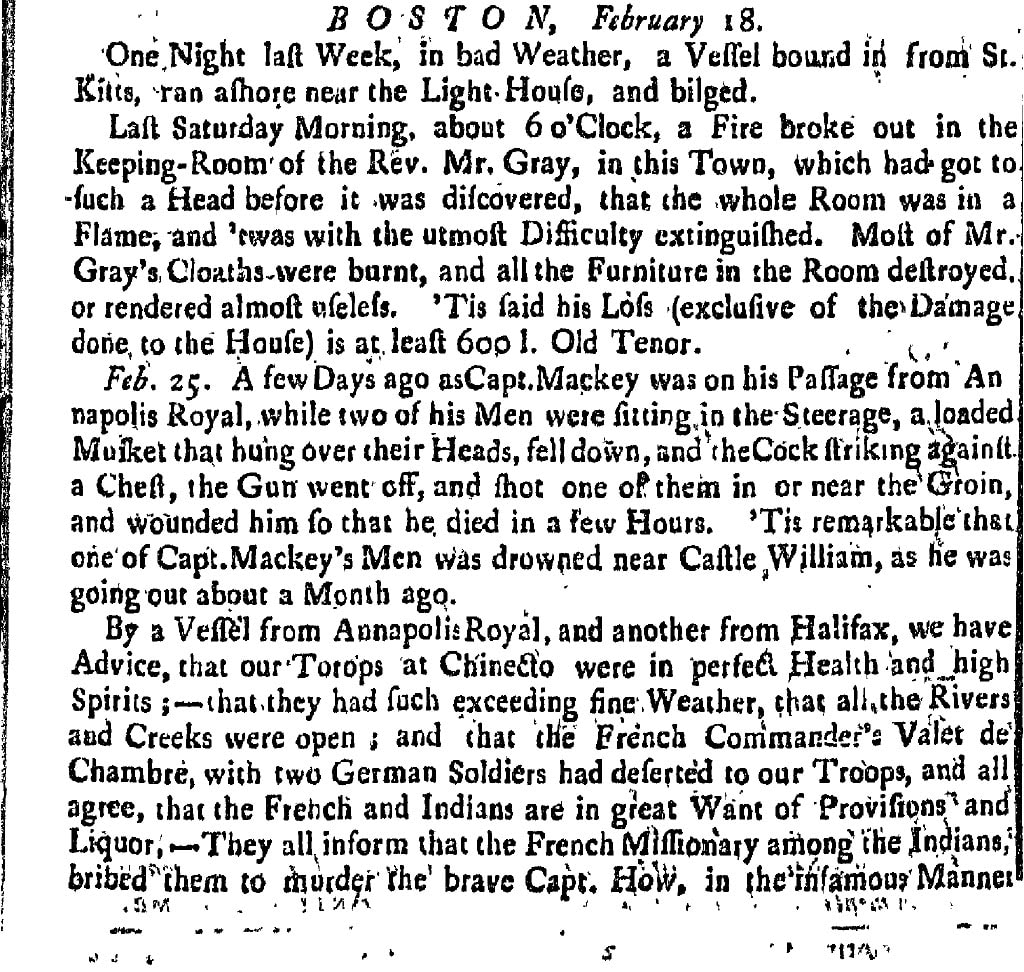

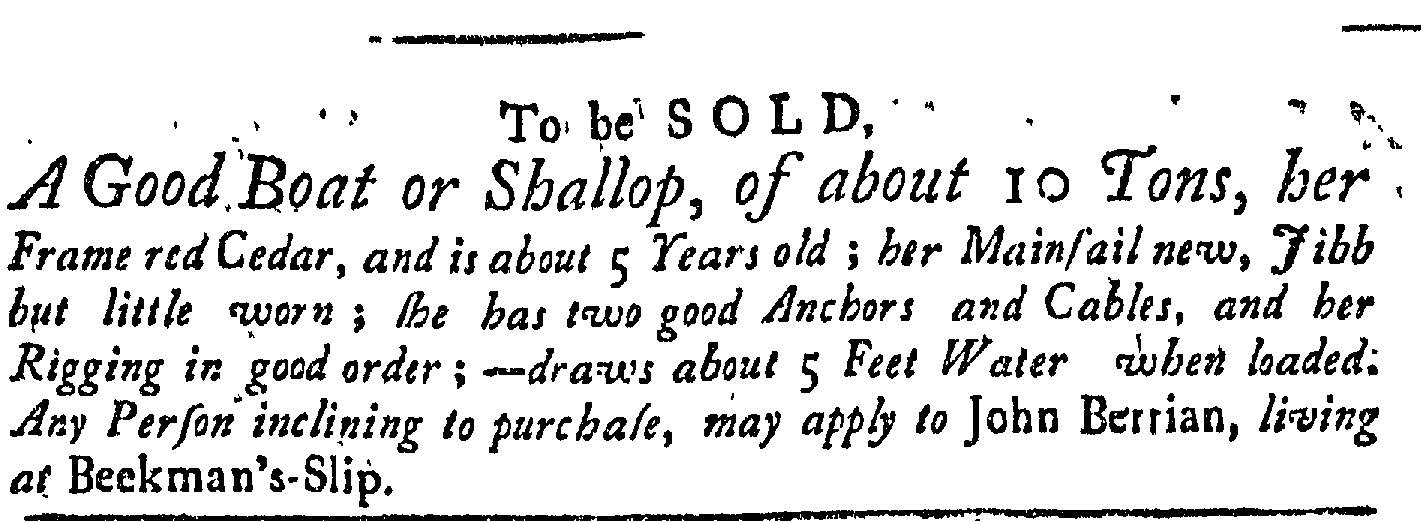

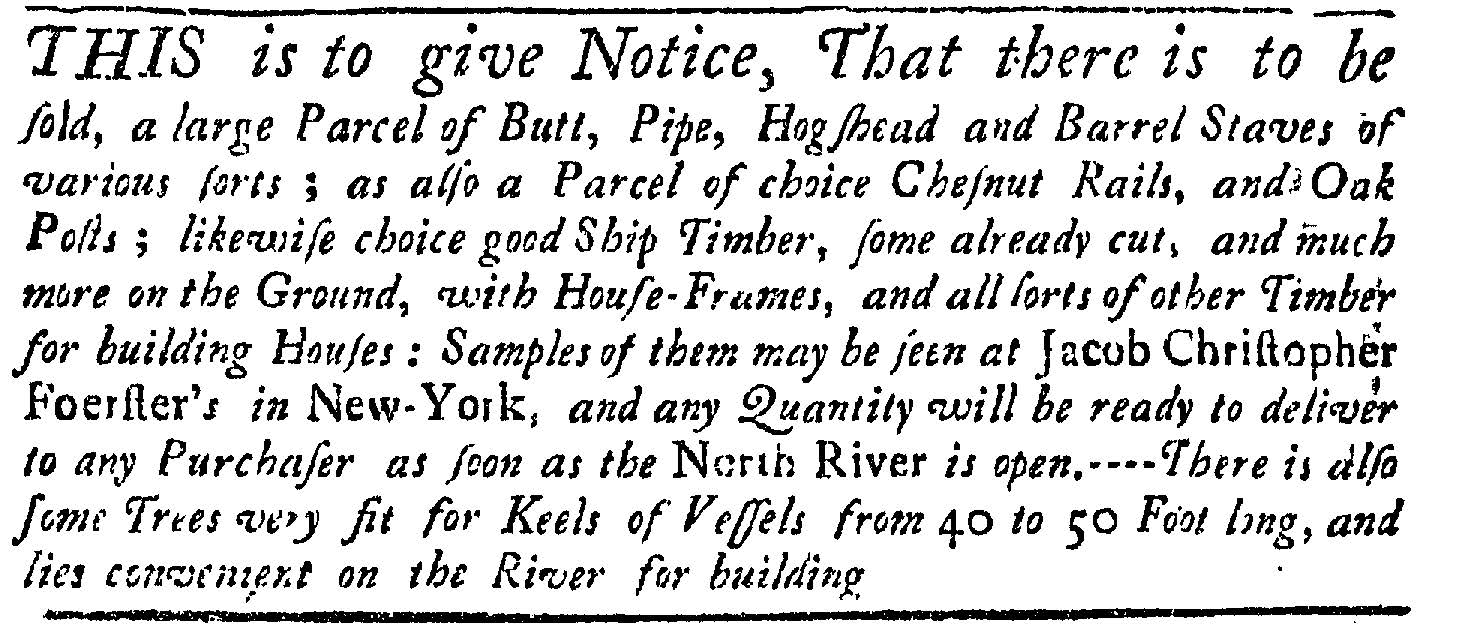
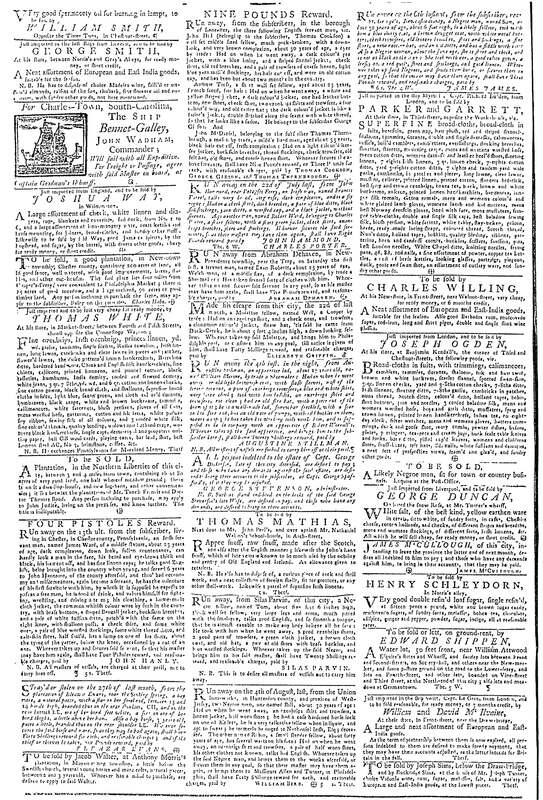

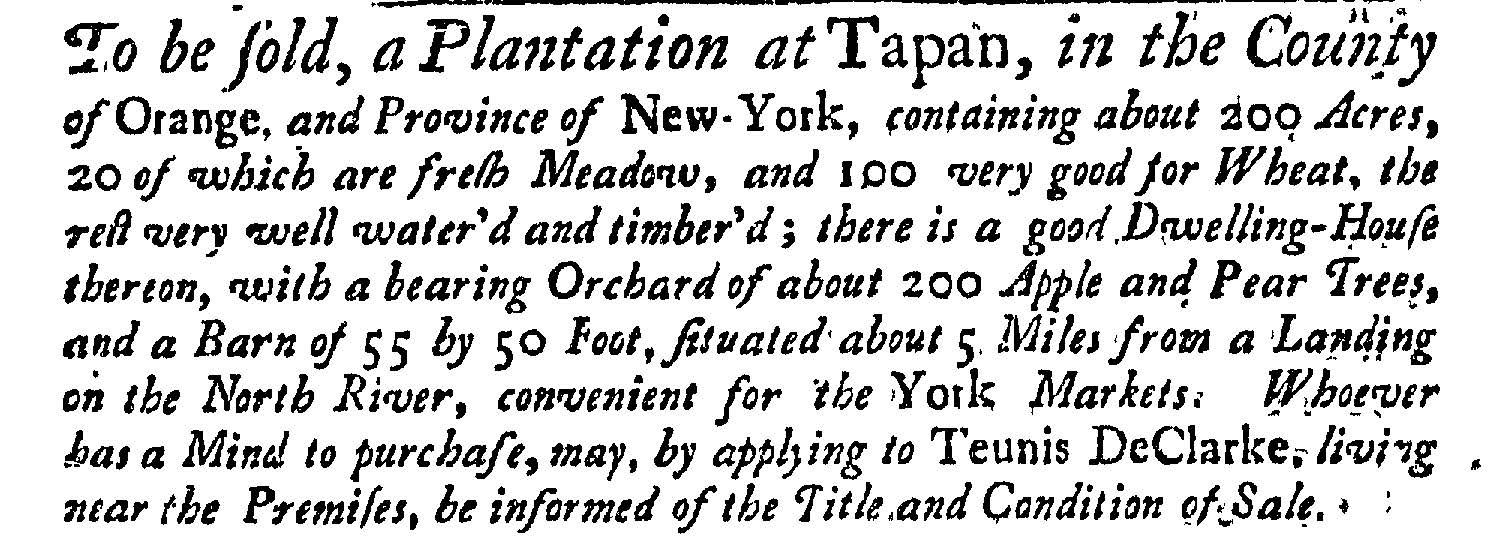
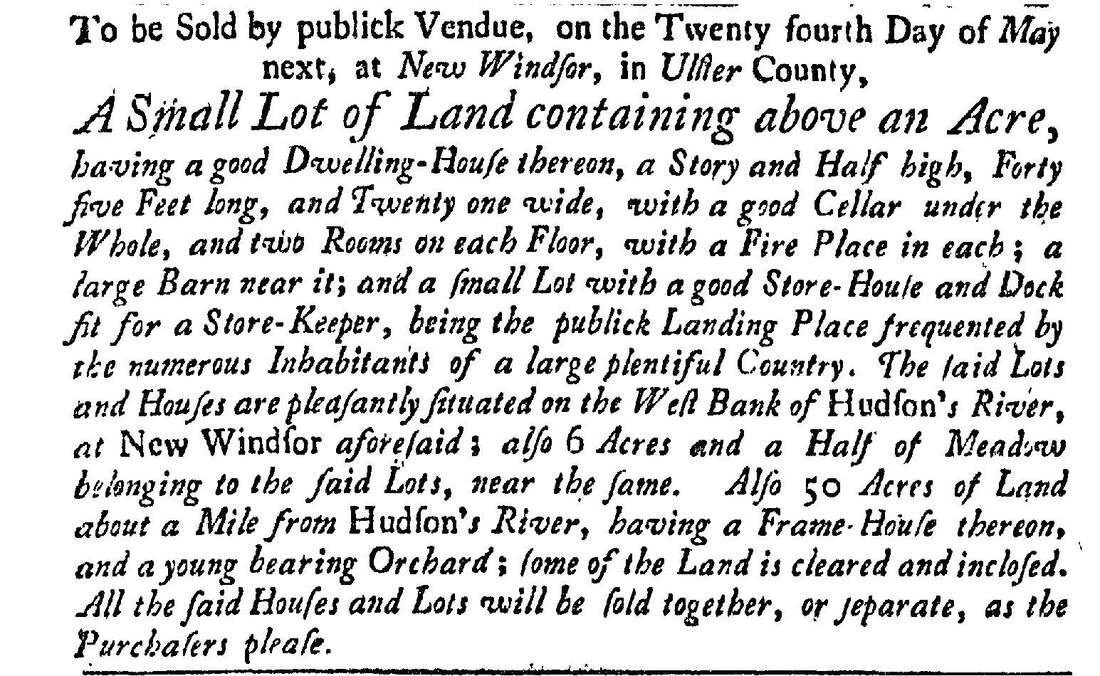
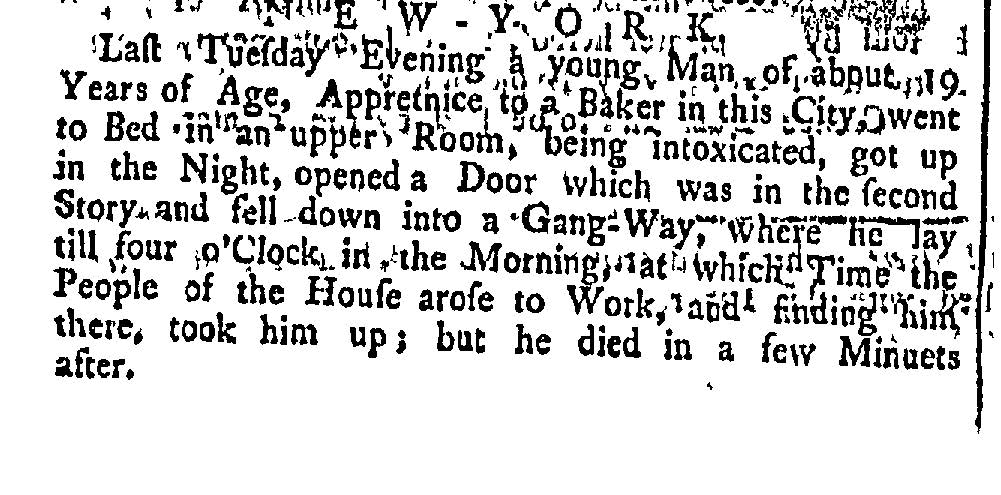
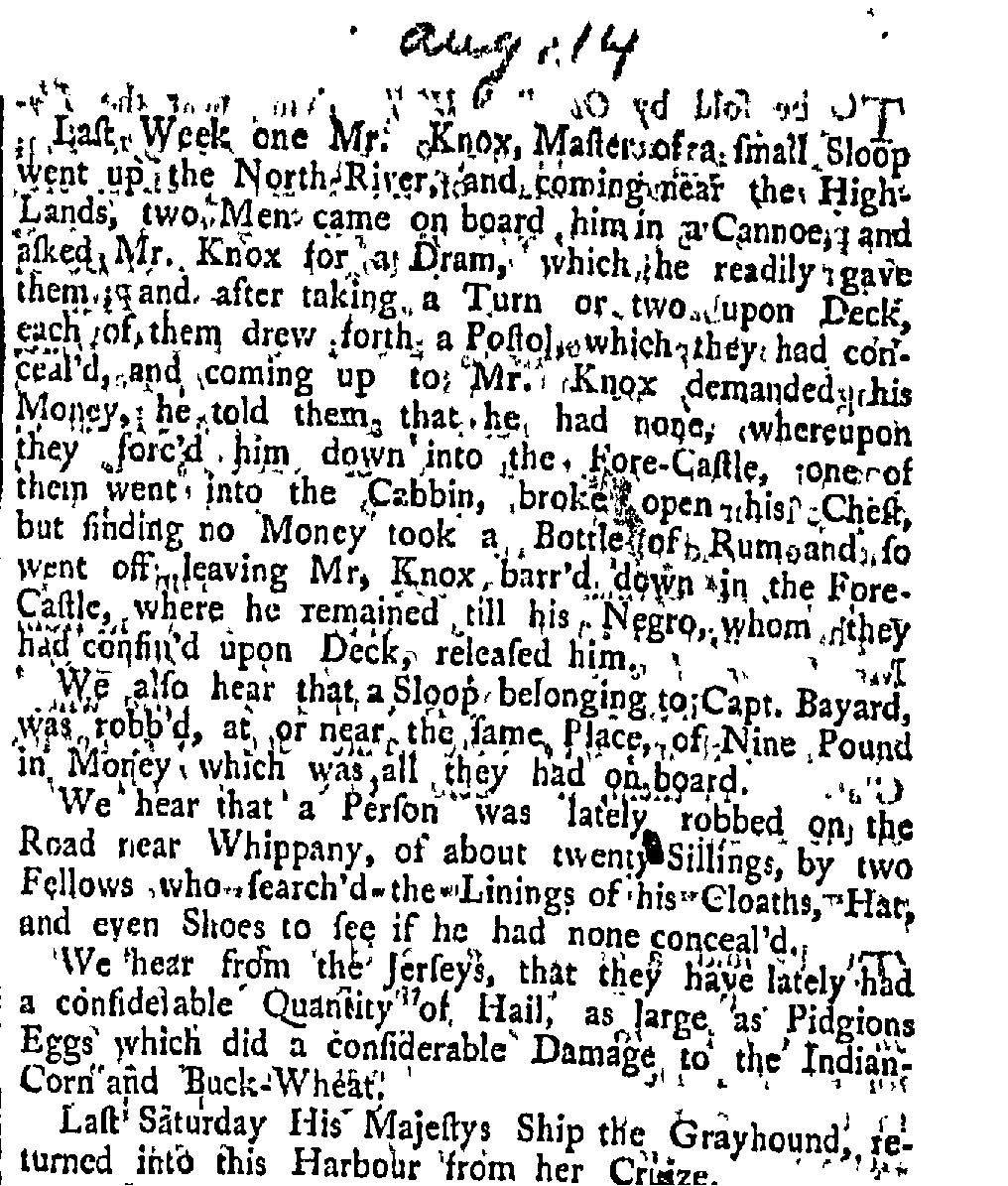
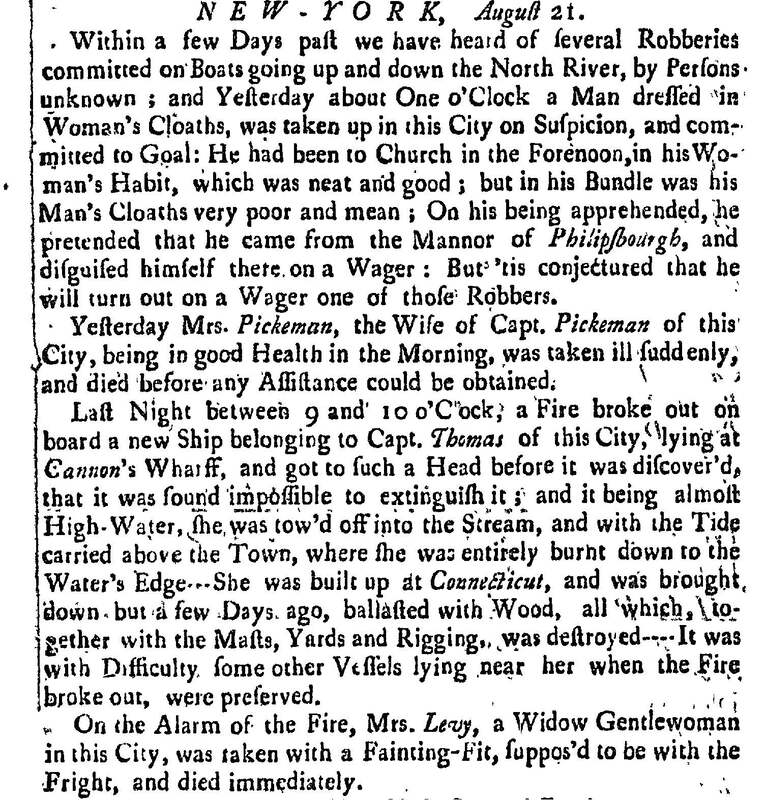
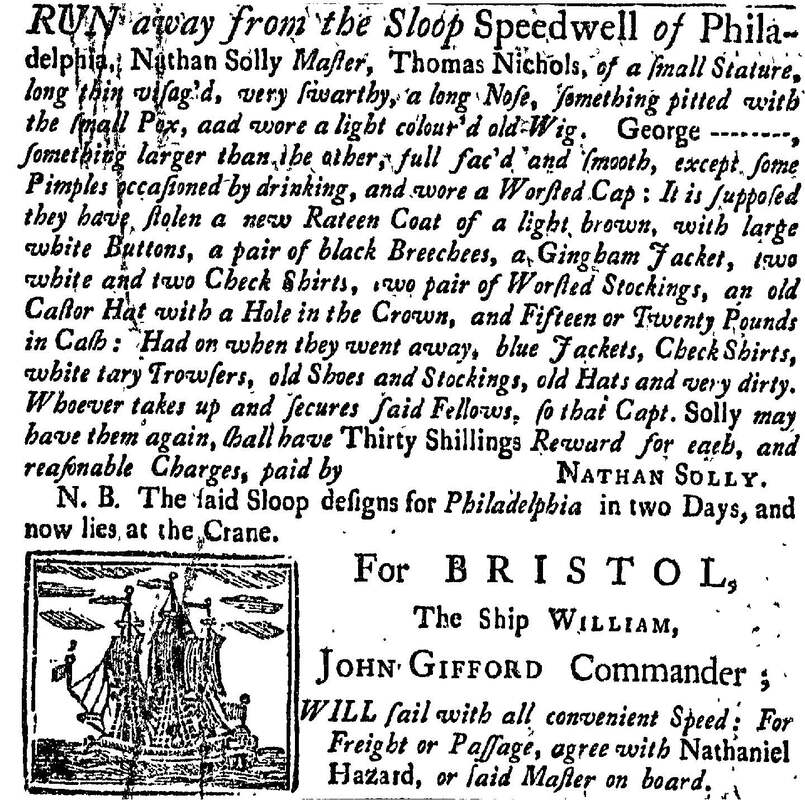
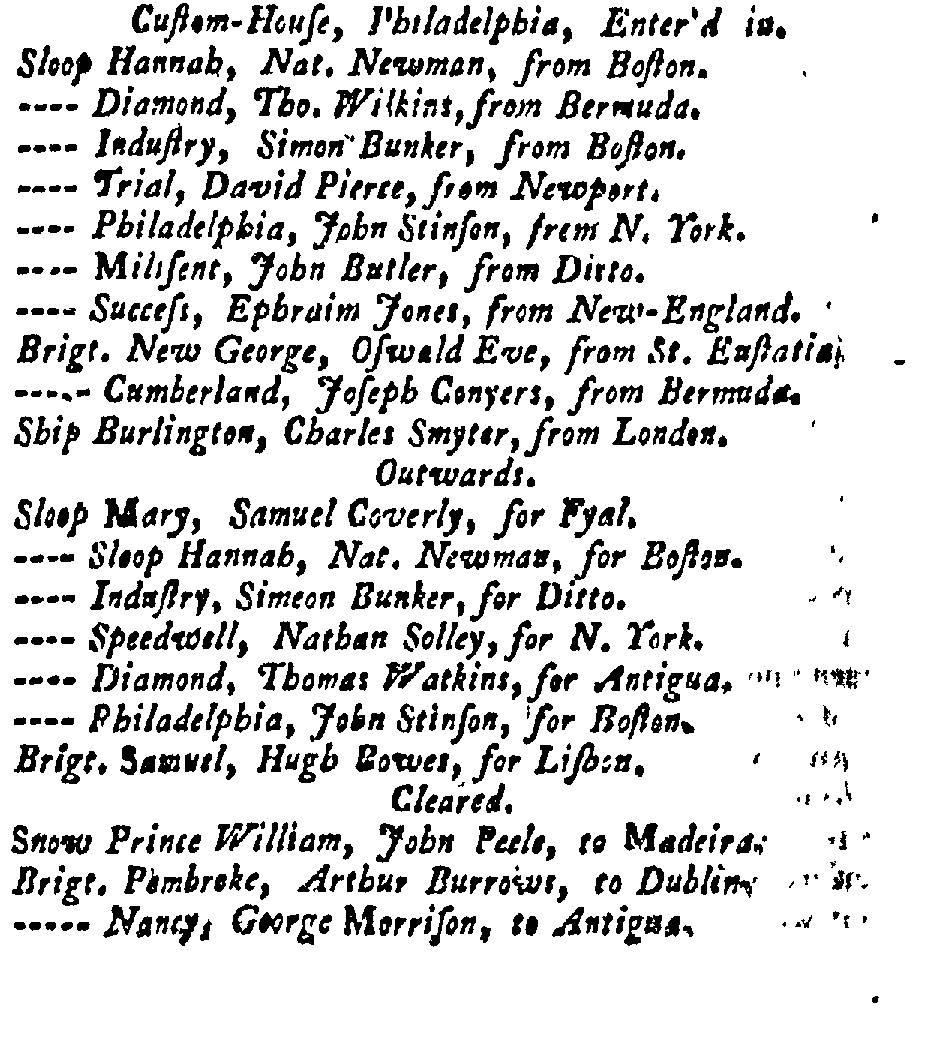
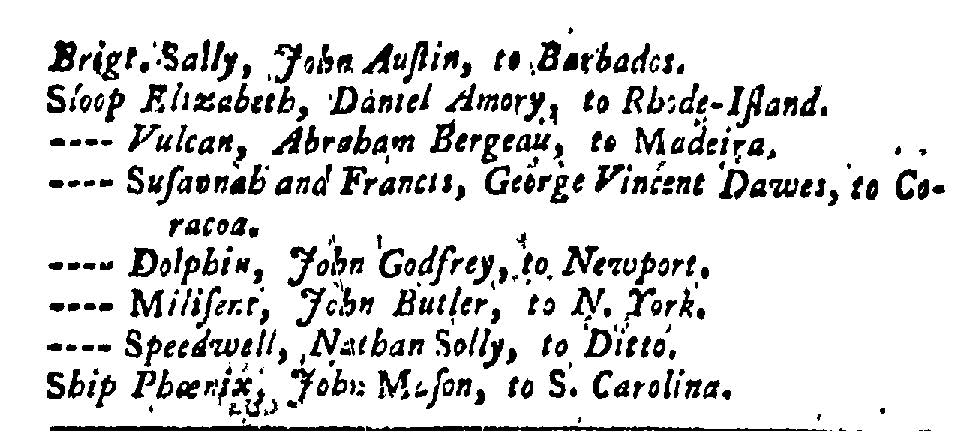

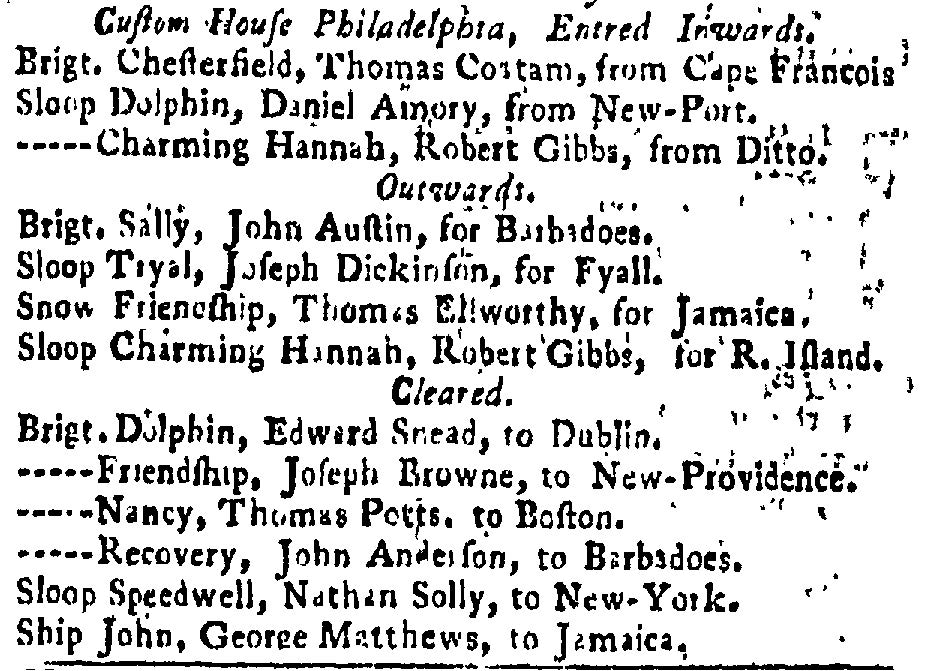
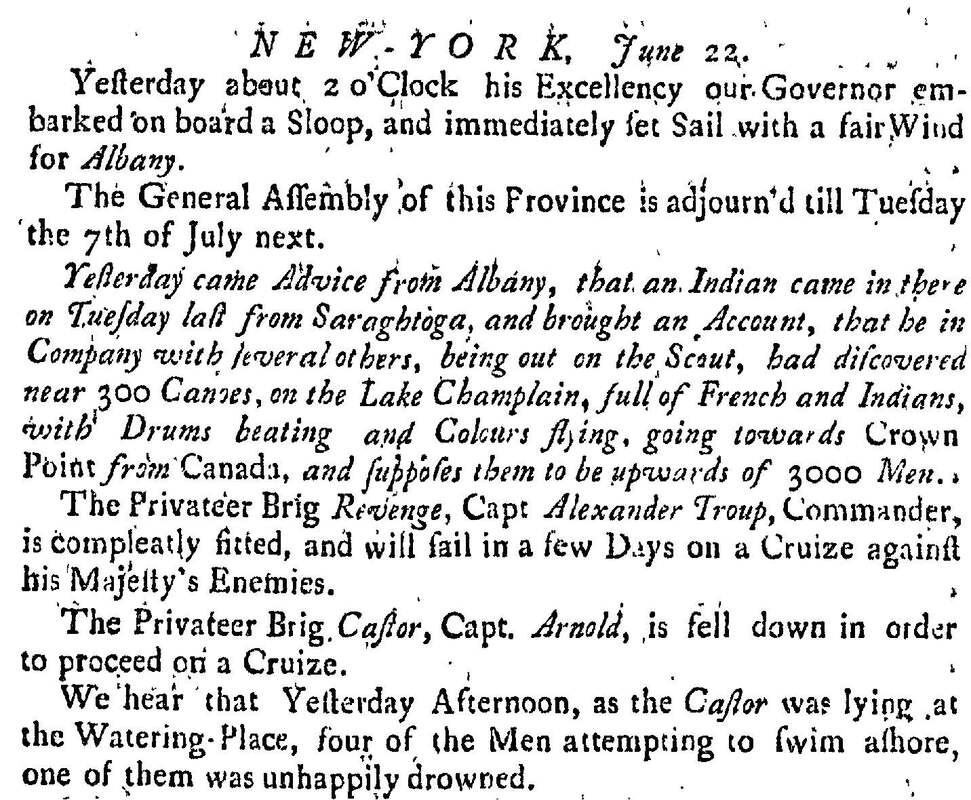
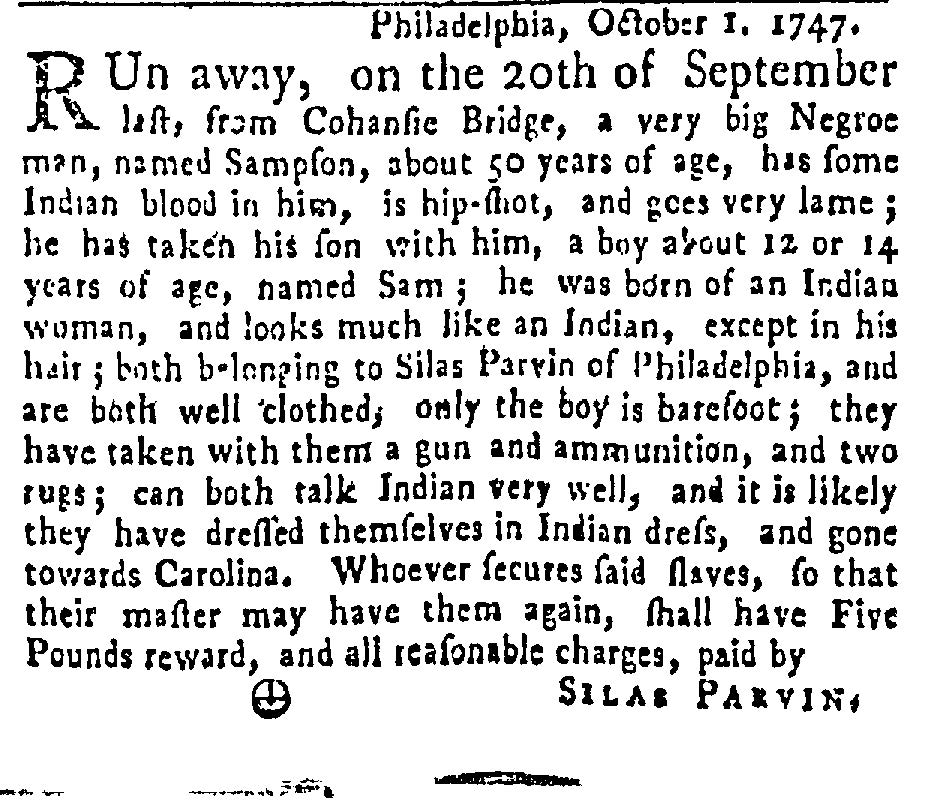
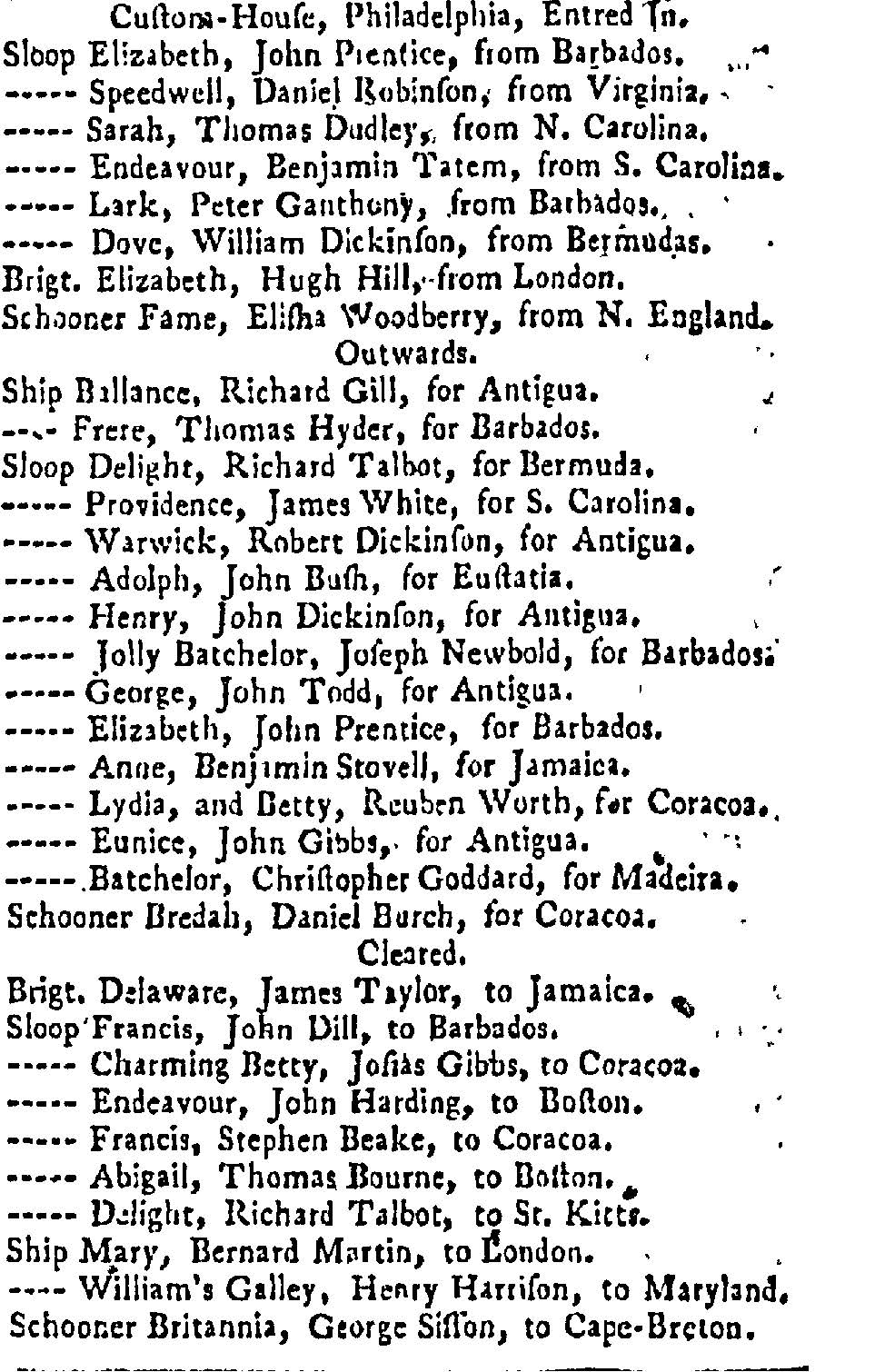
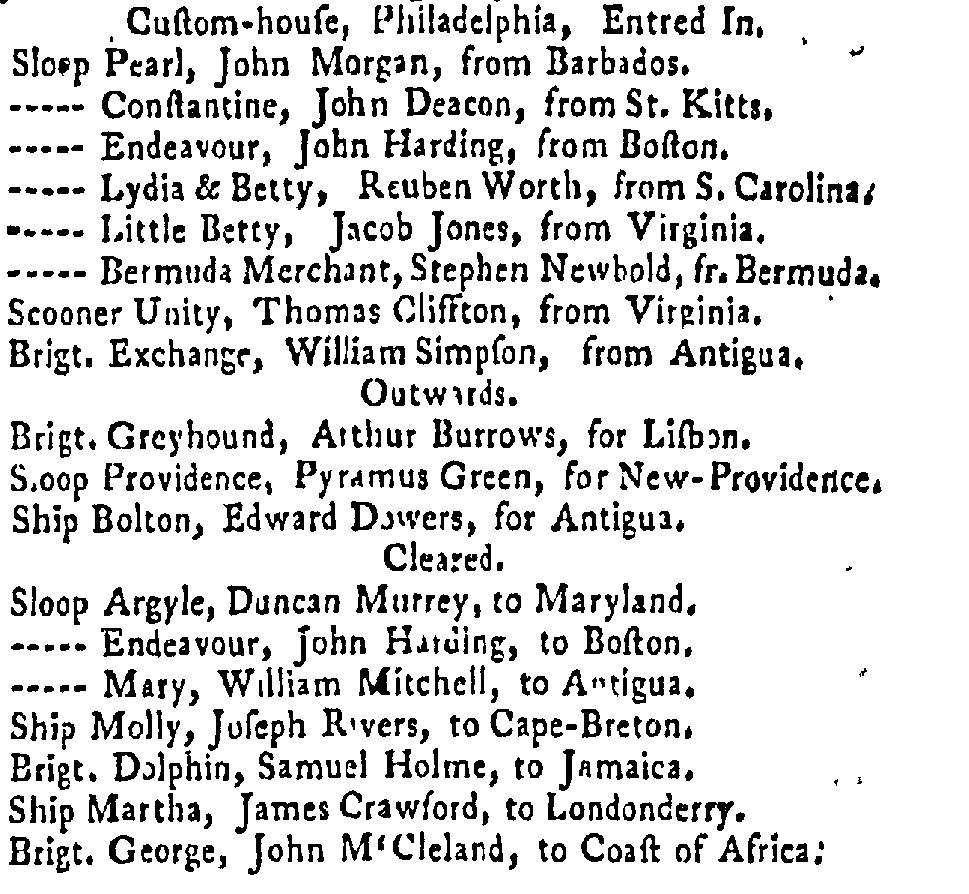
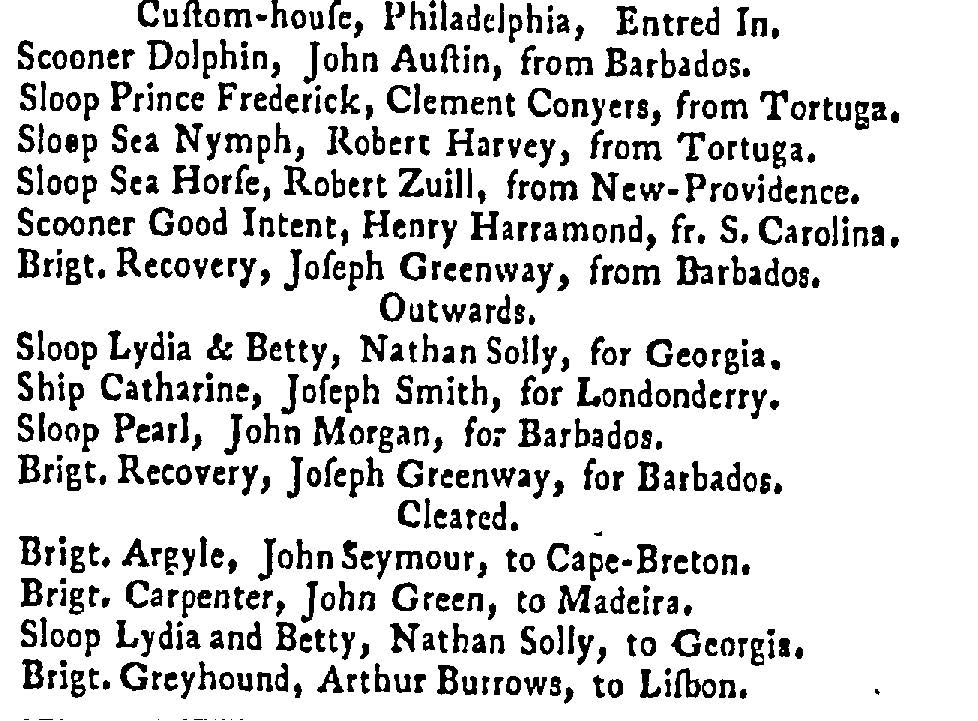
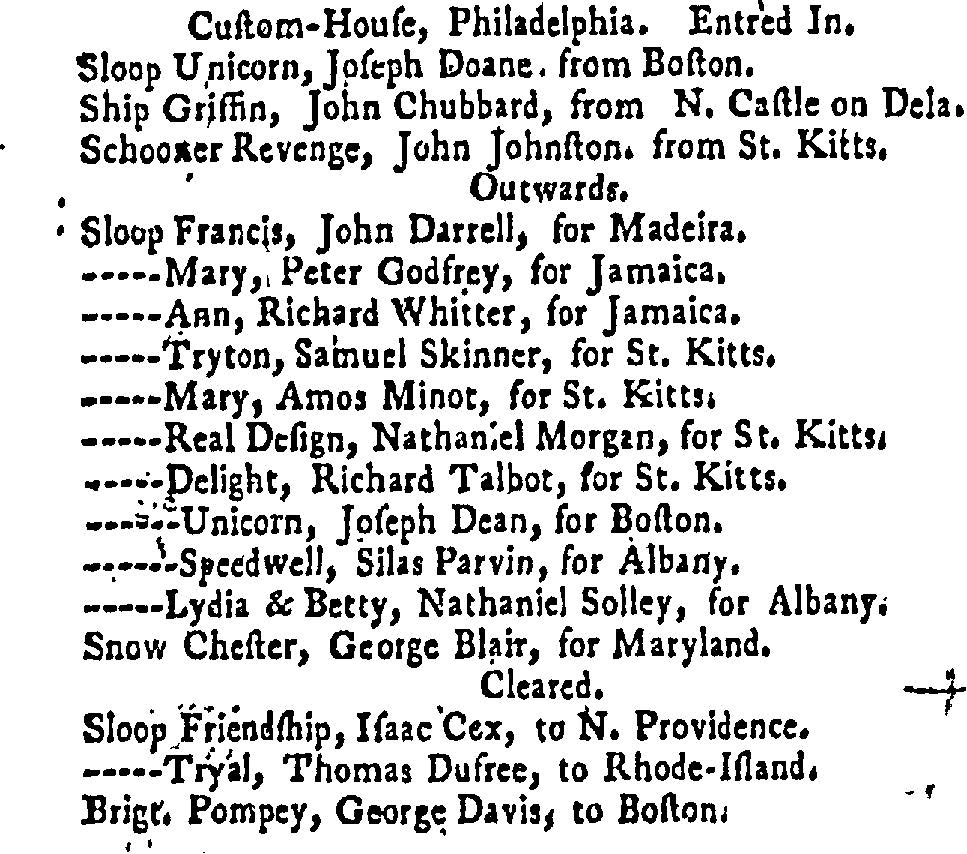
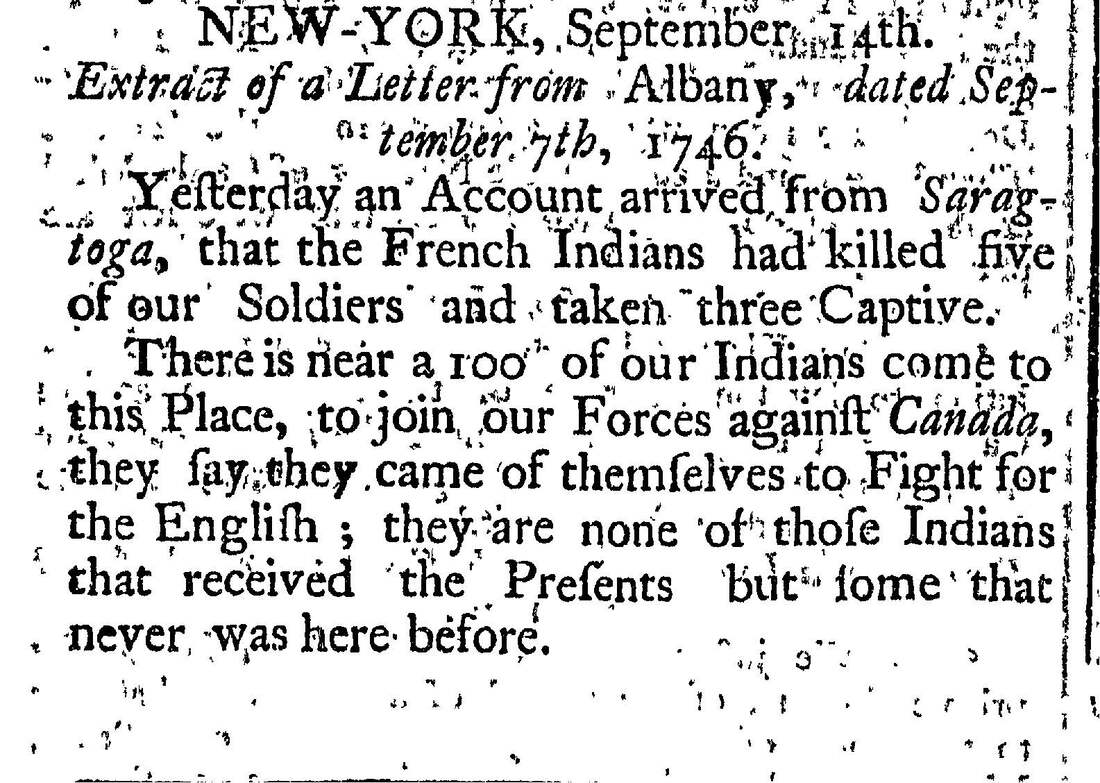
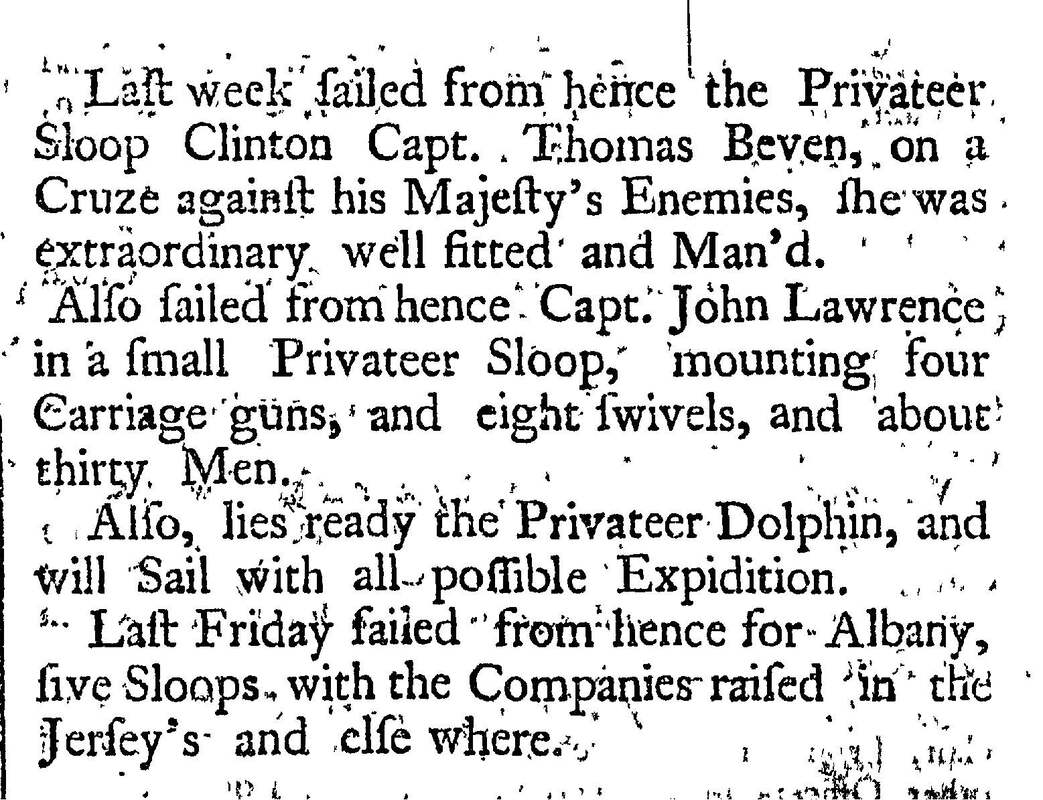
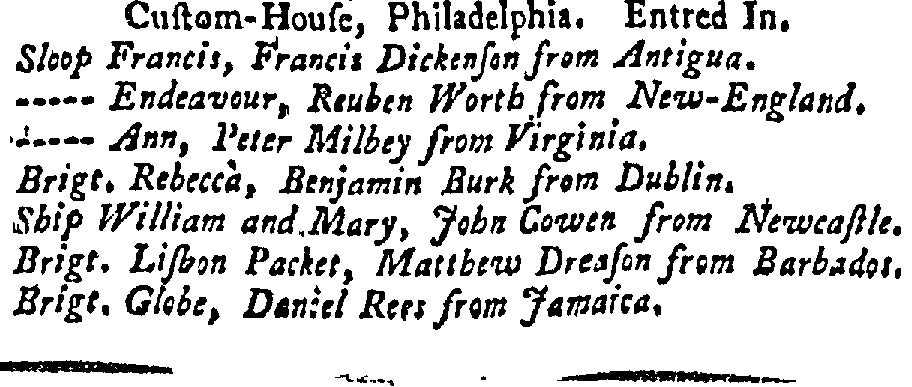
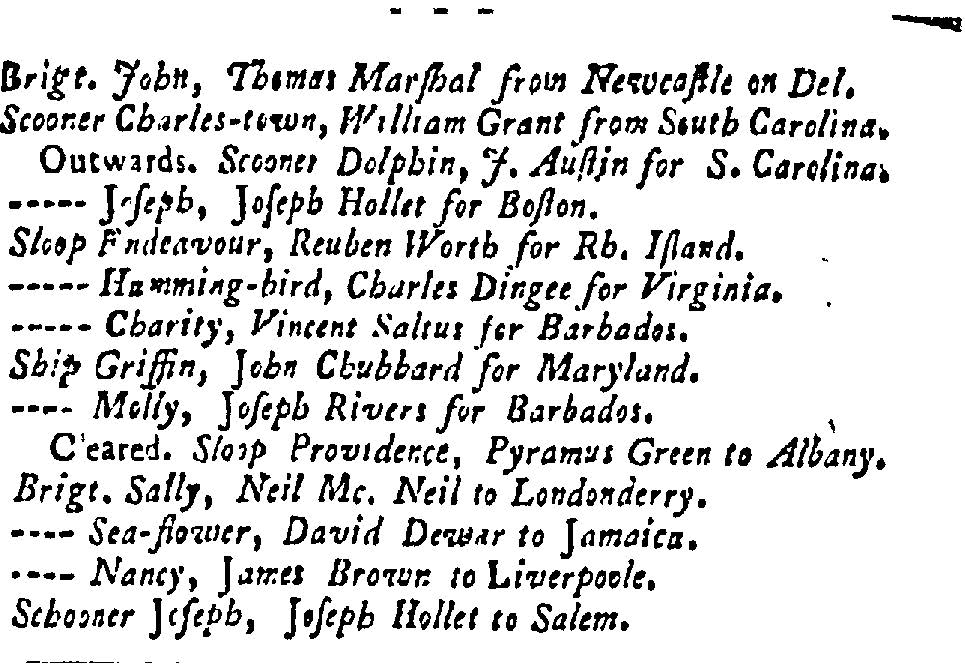
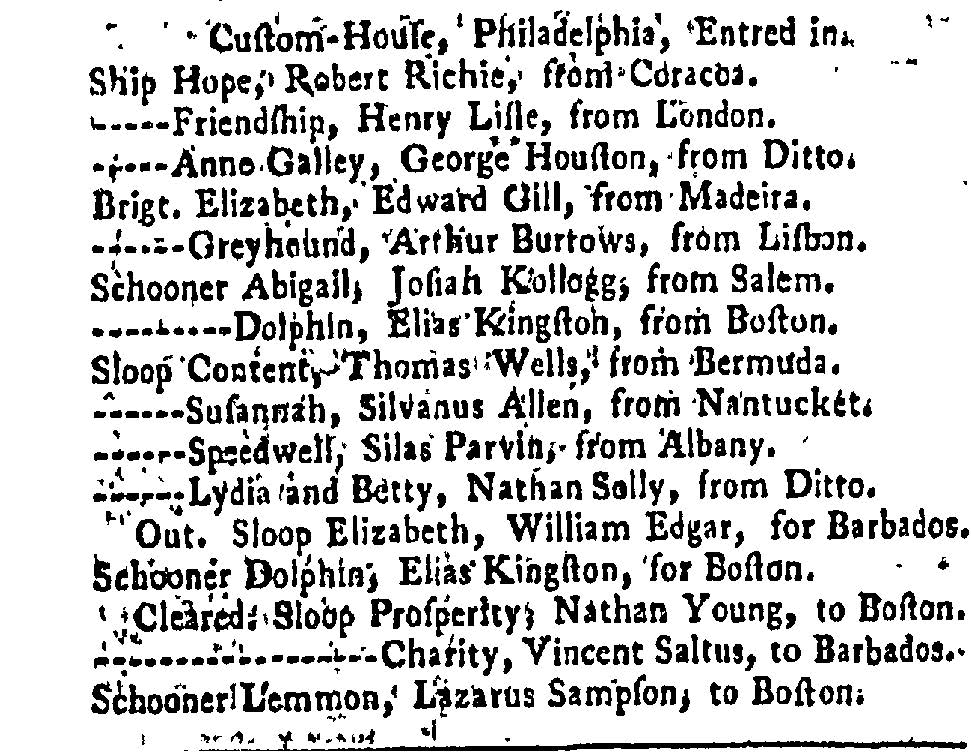
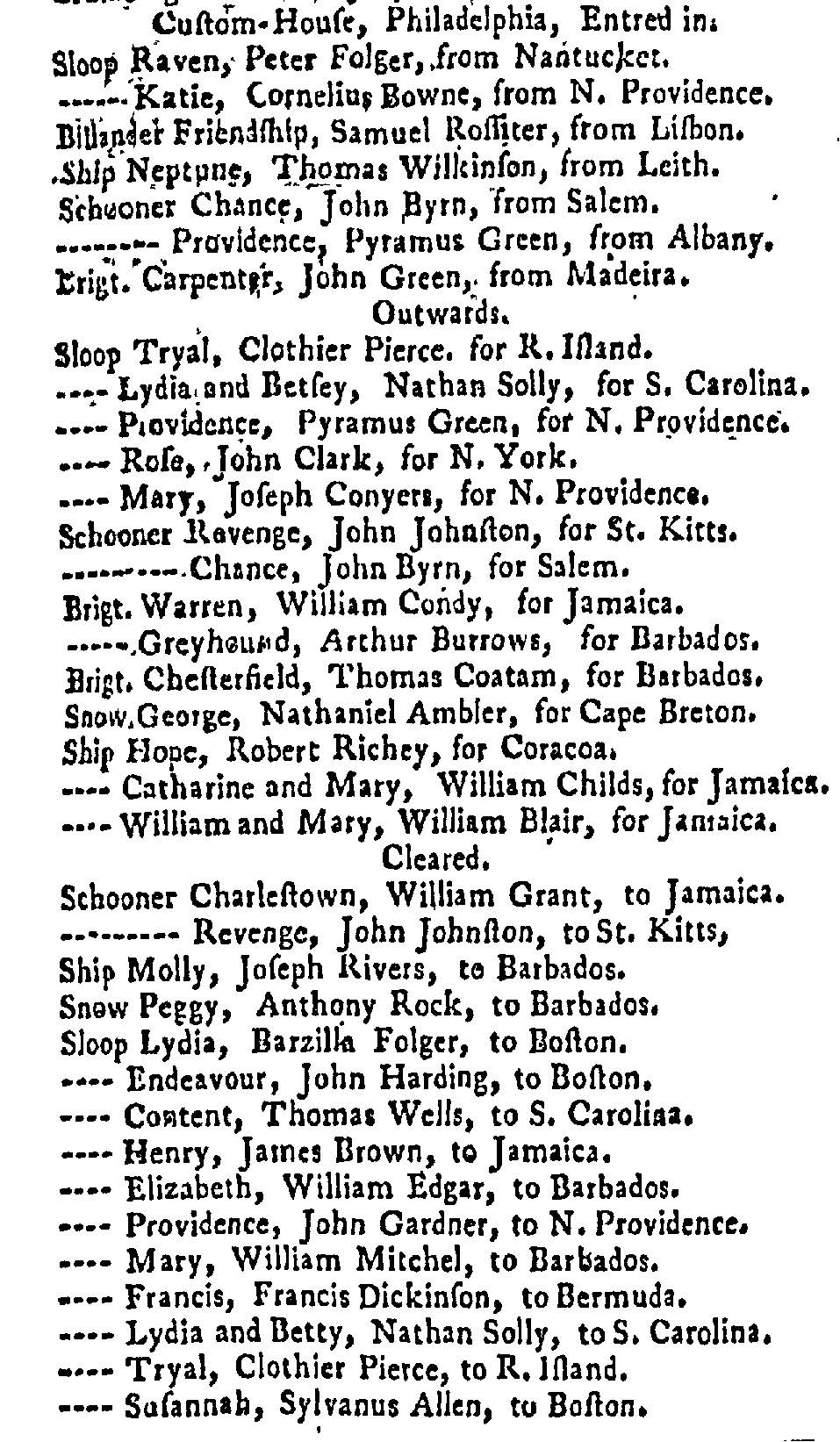
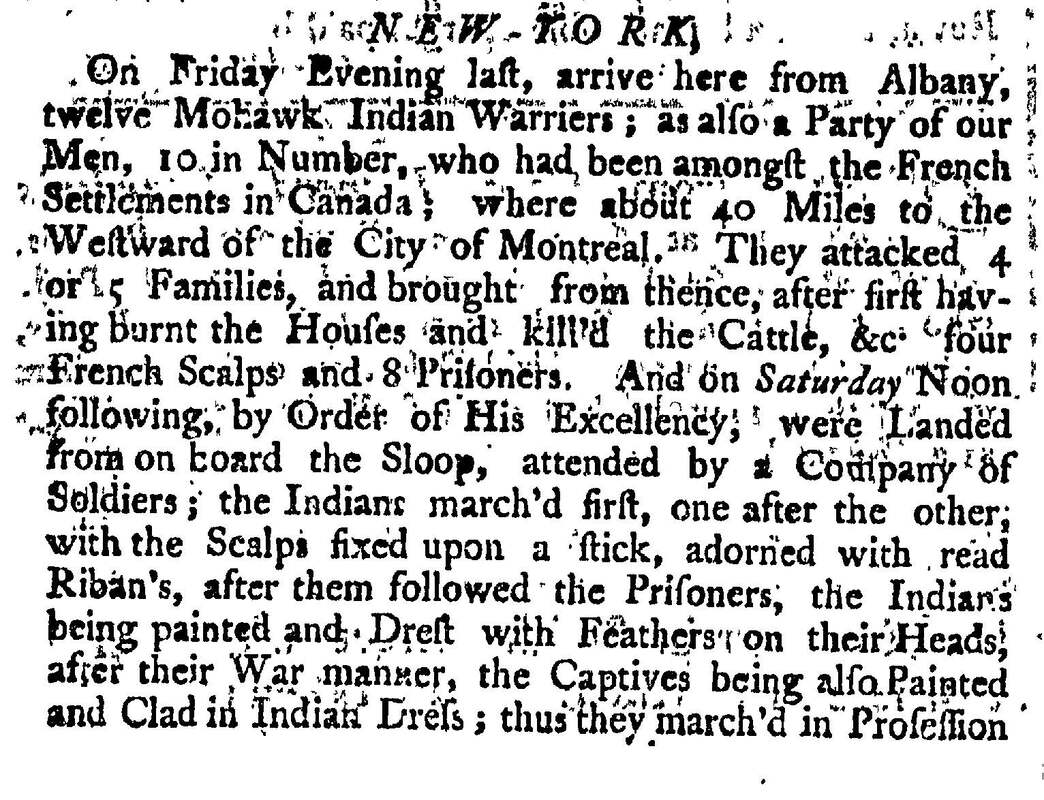

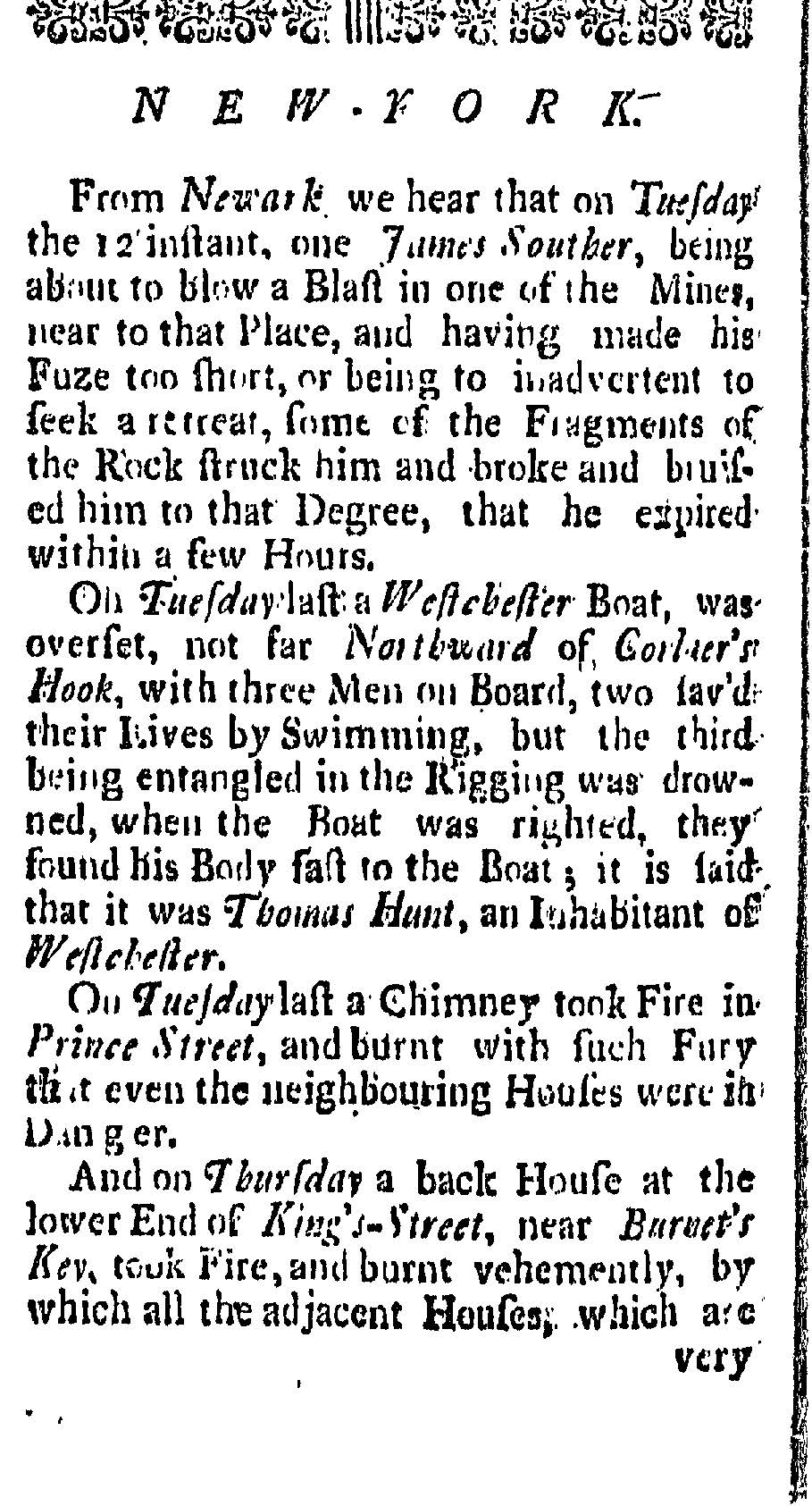
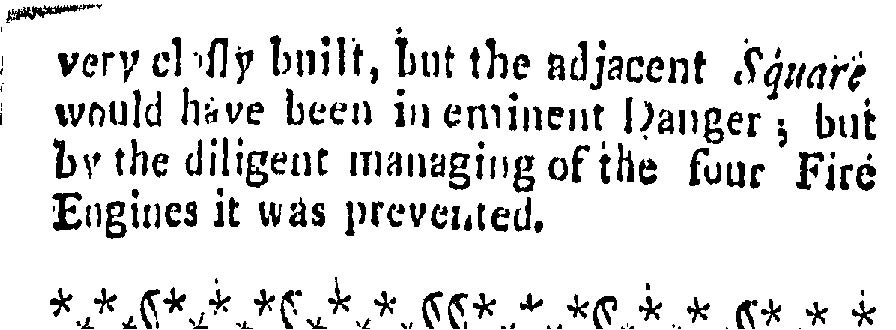
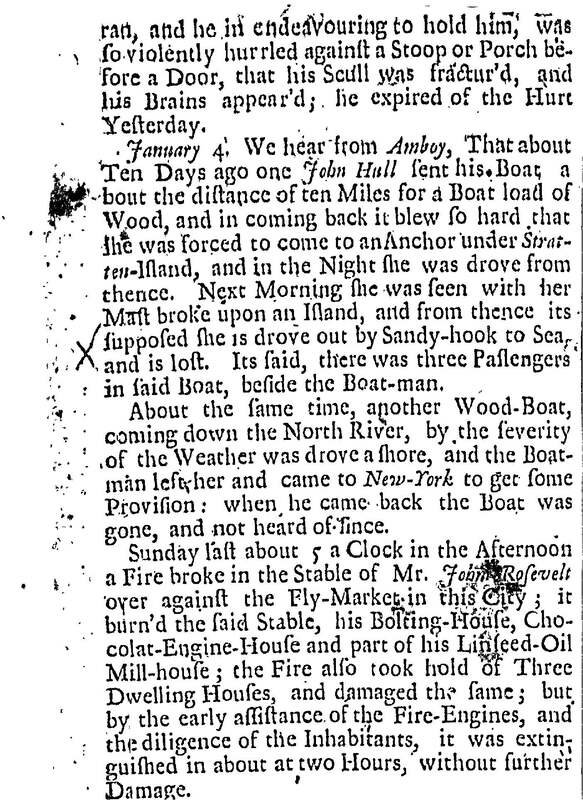
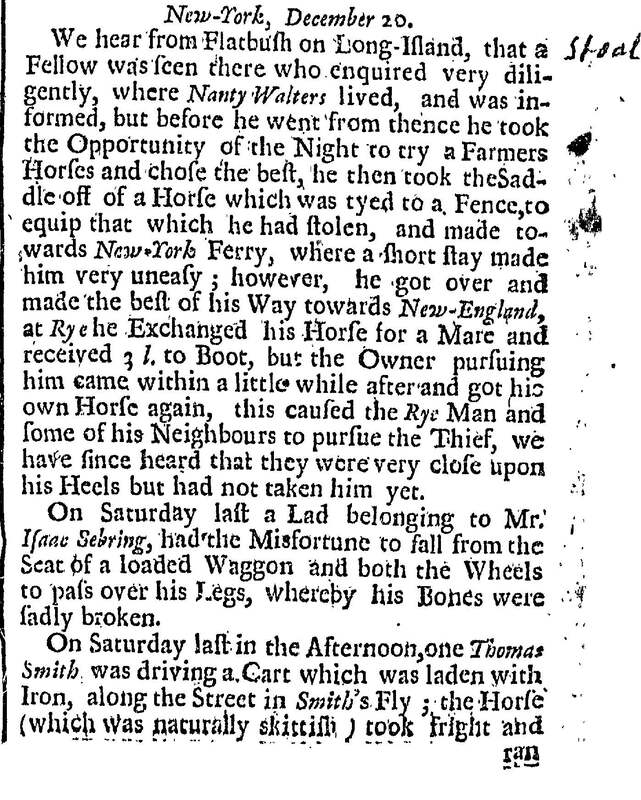
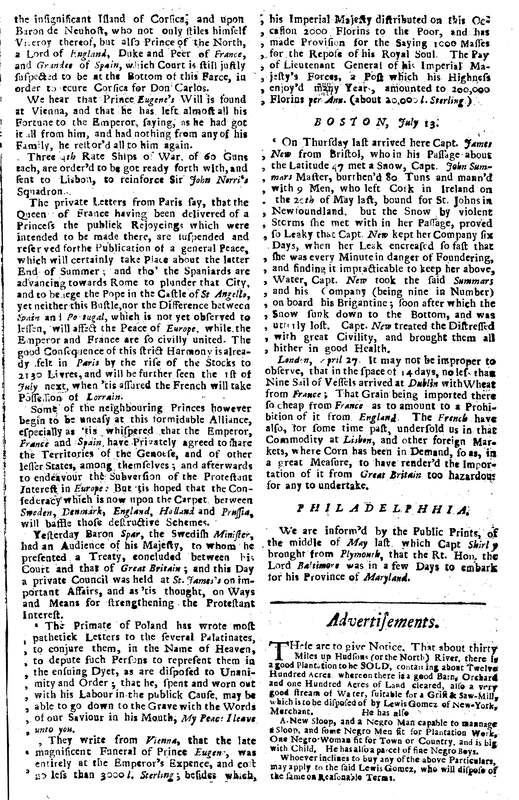
 RSS Feed
RSS Feed